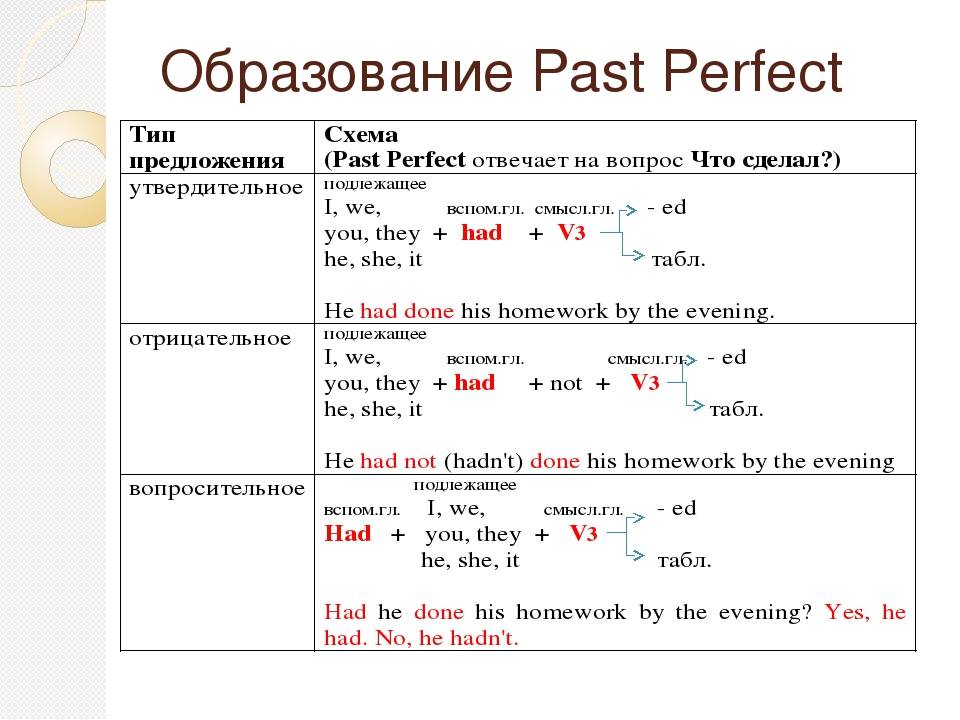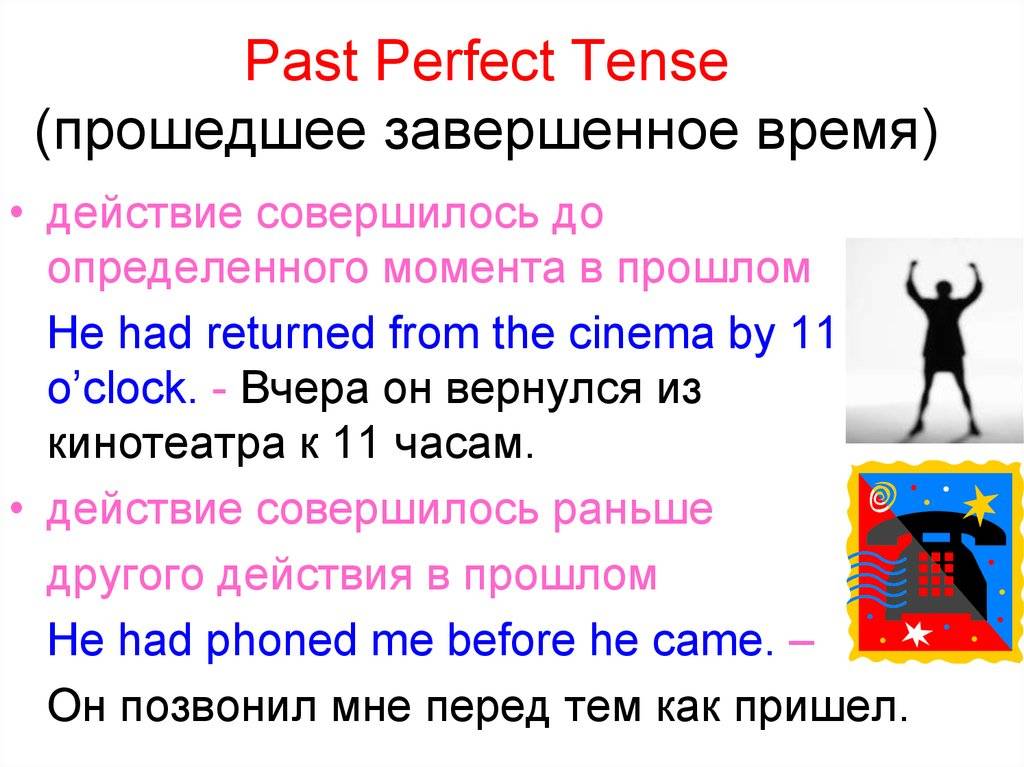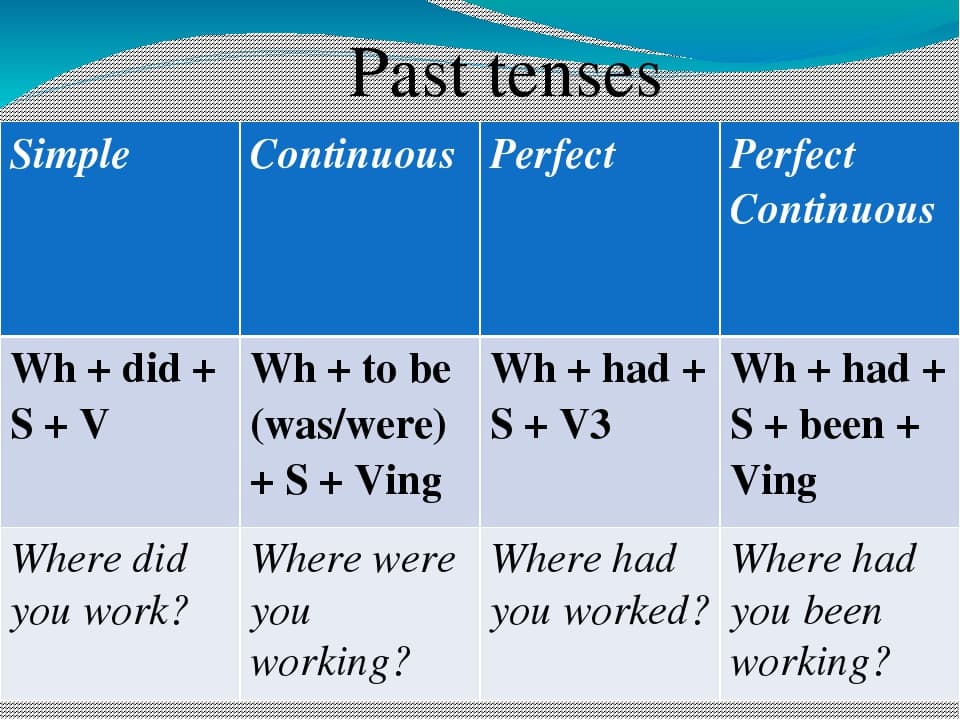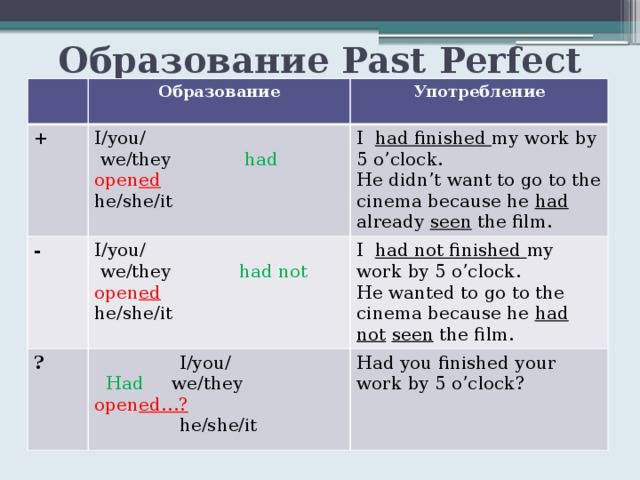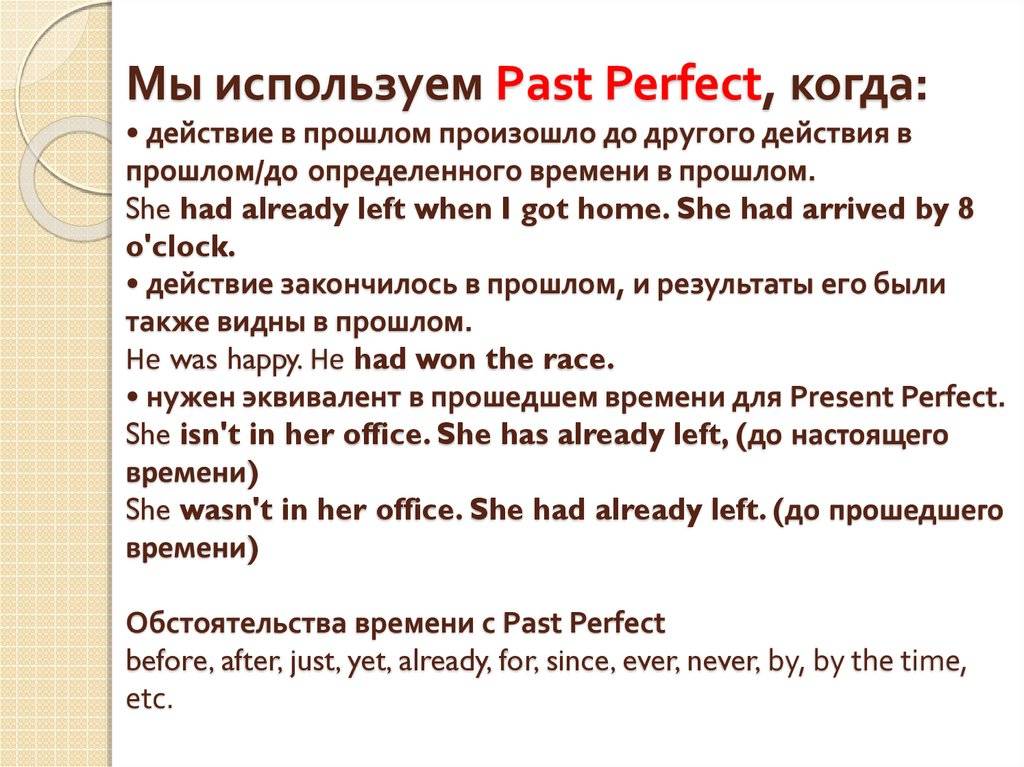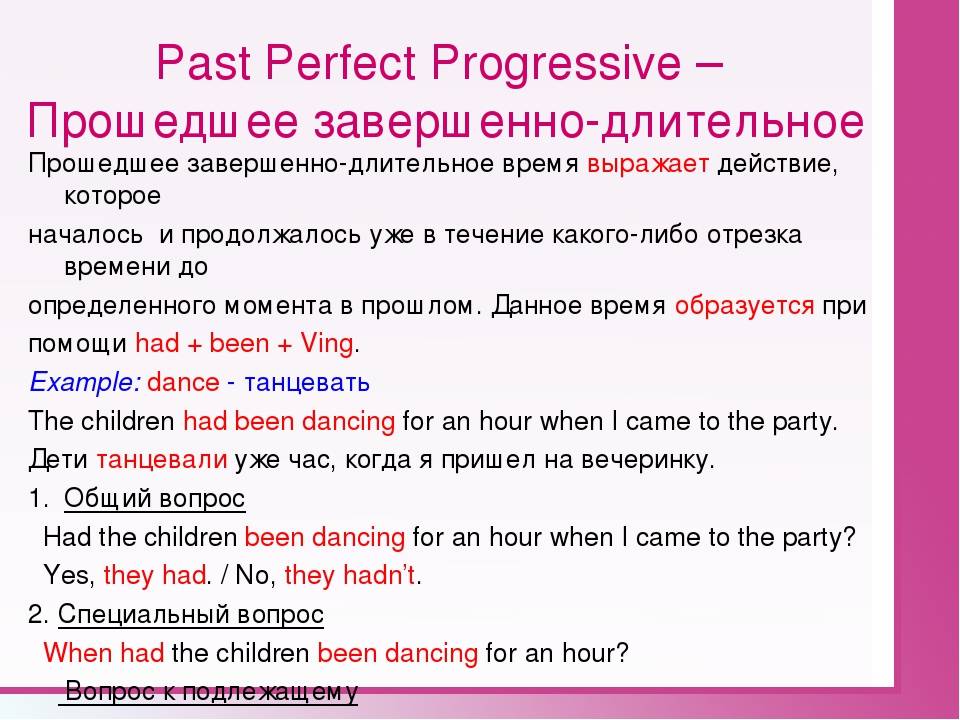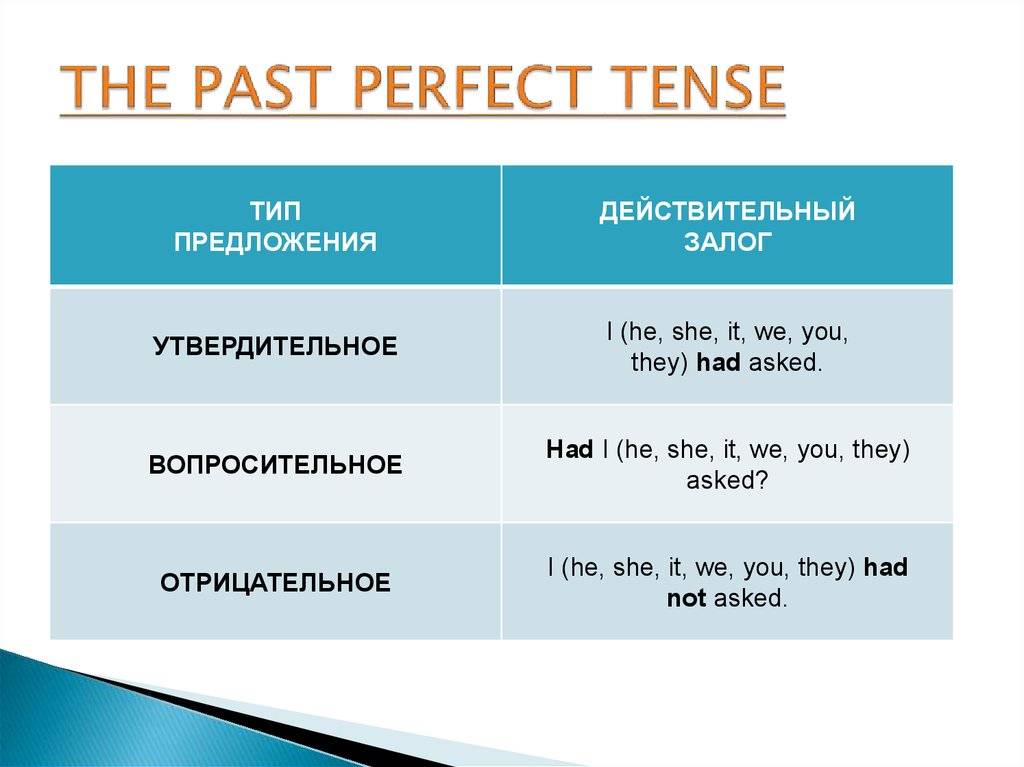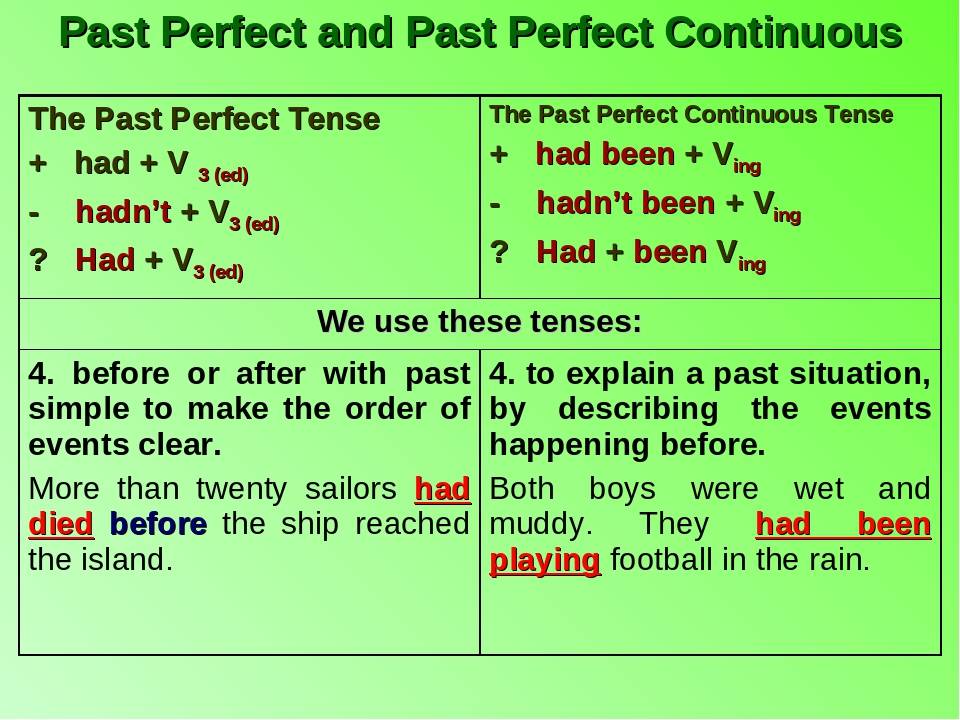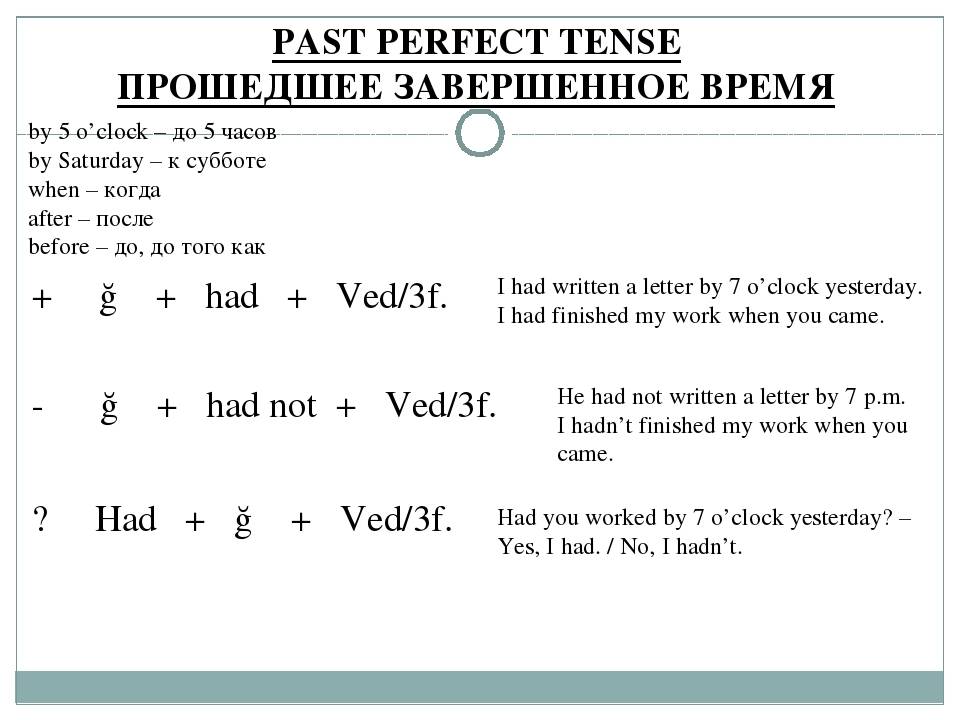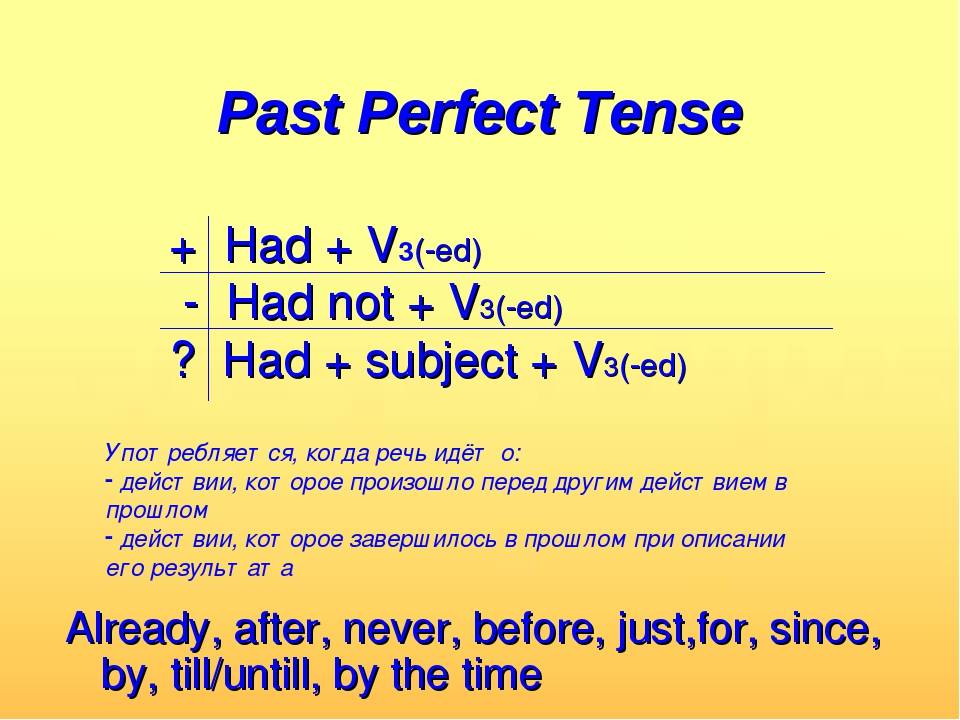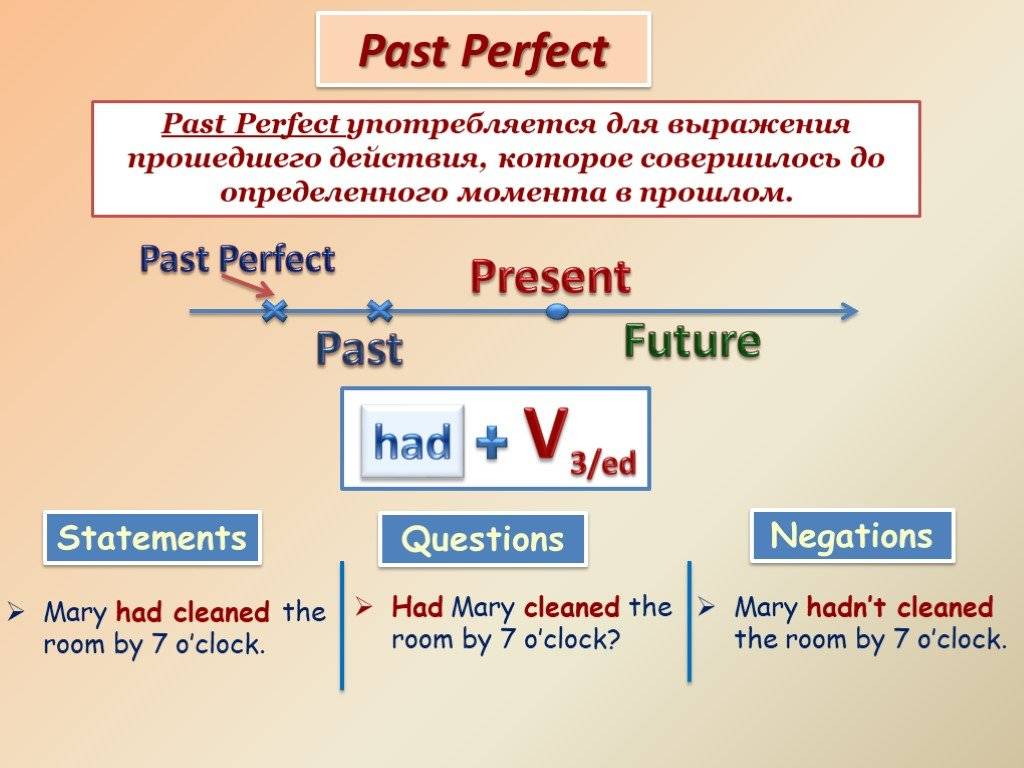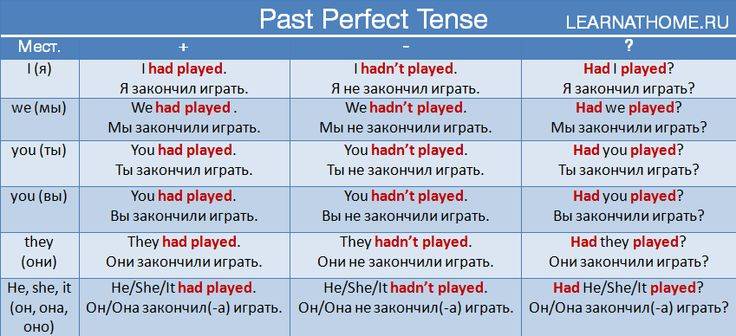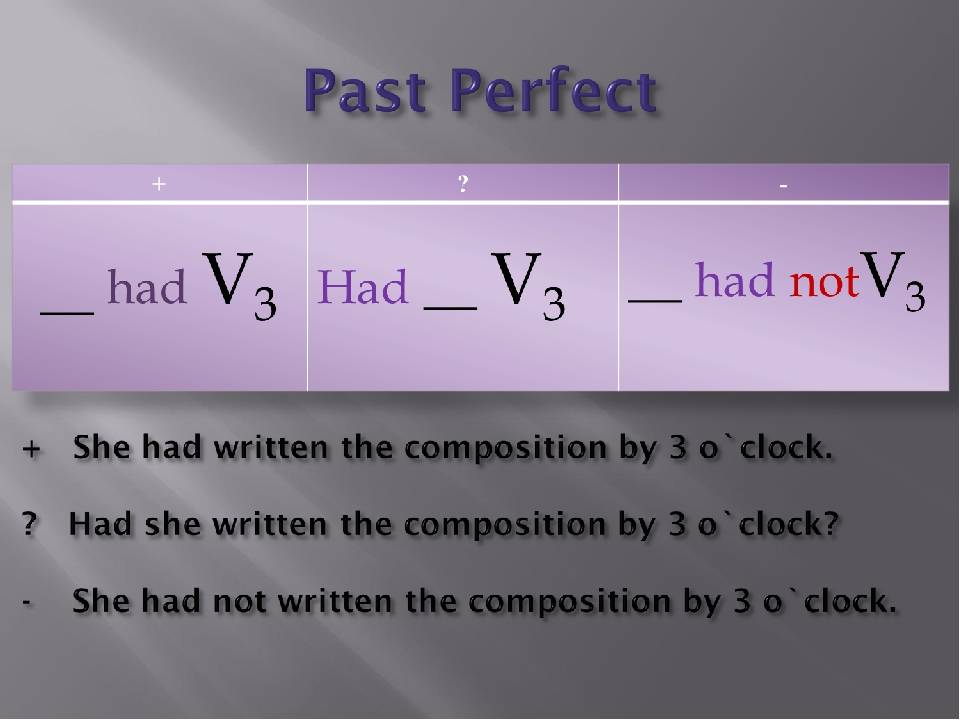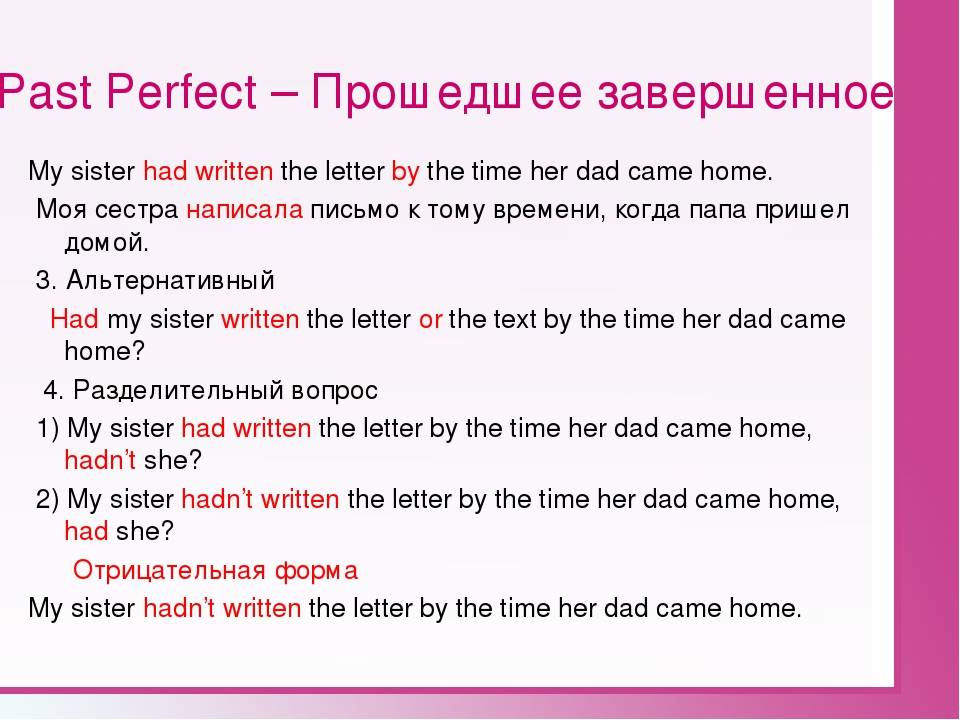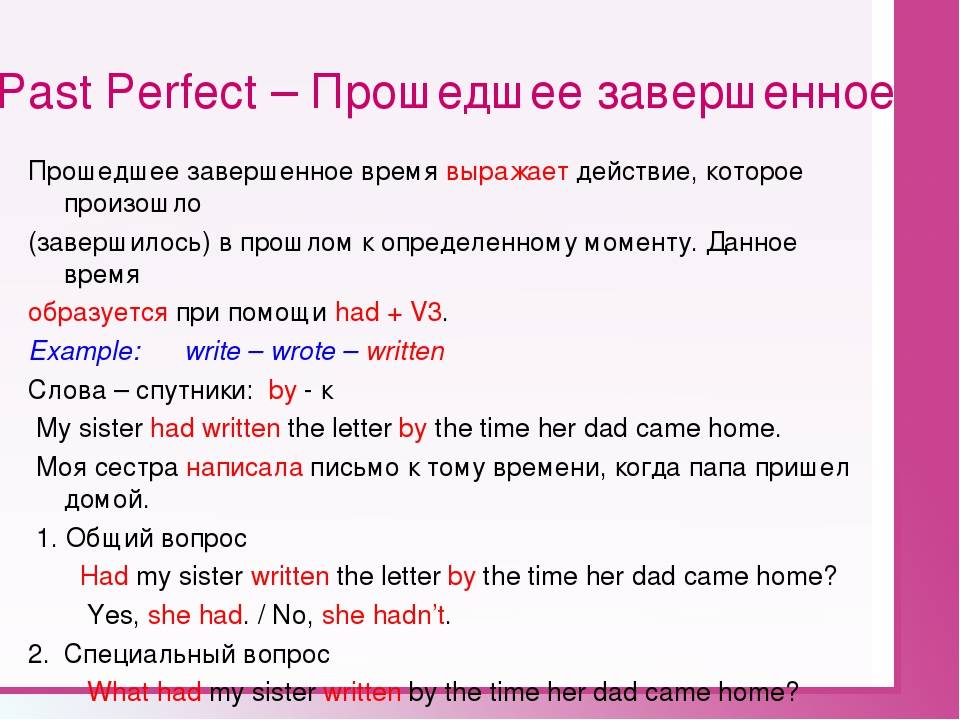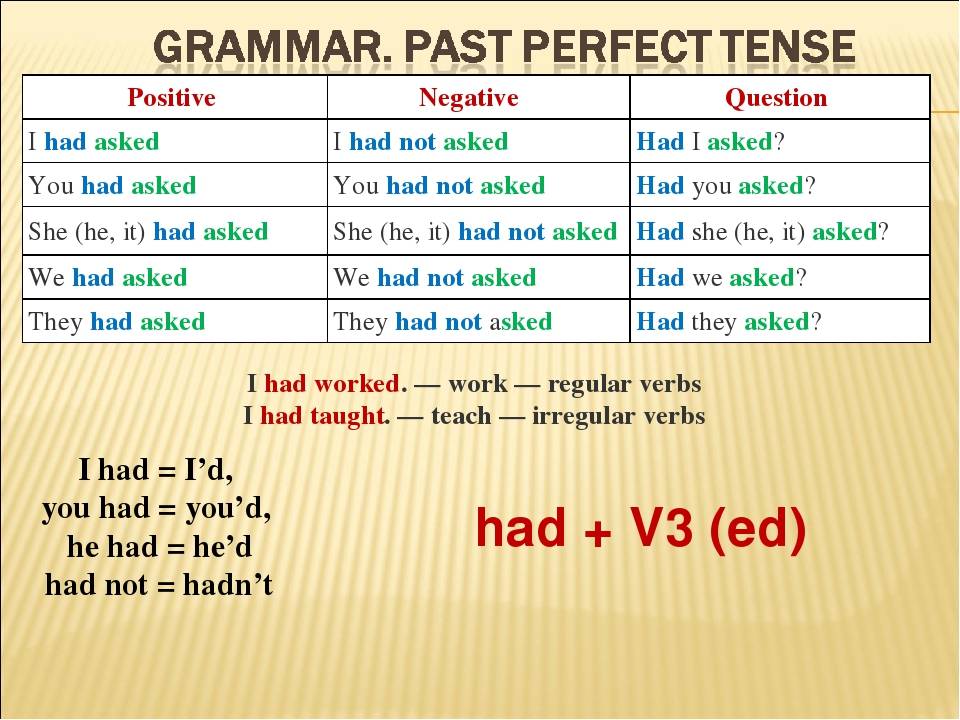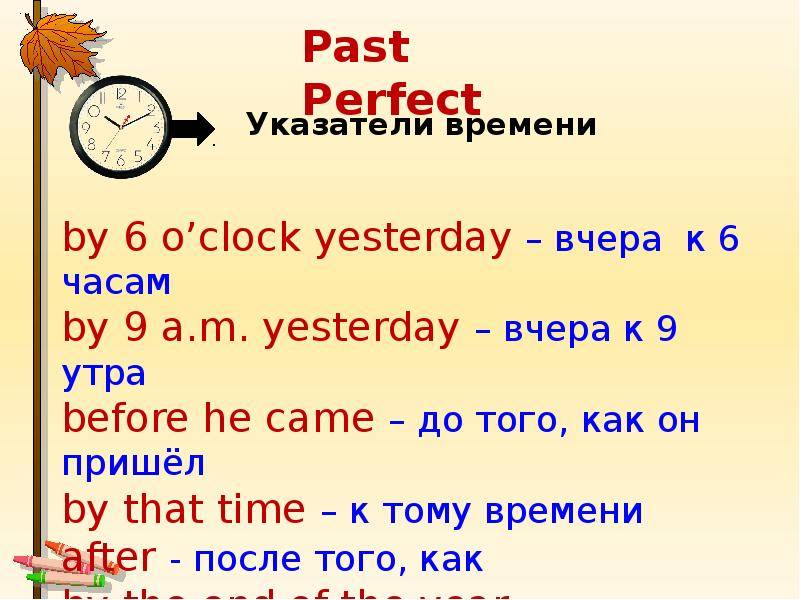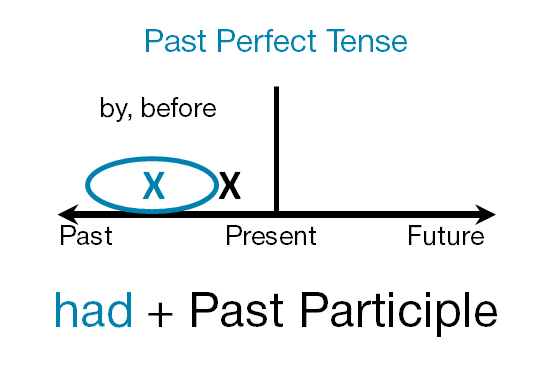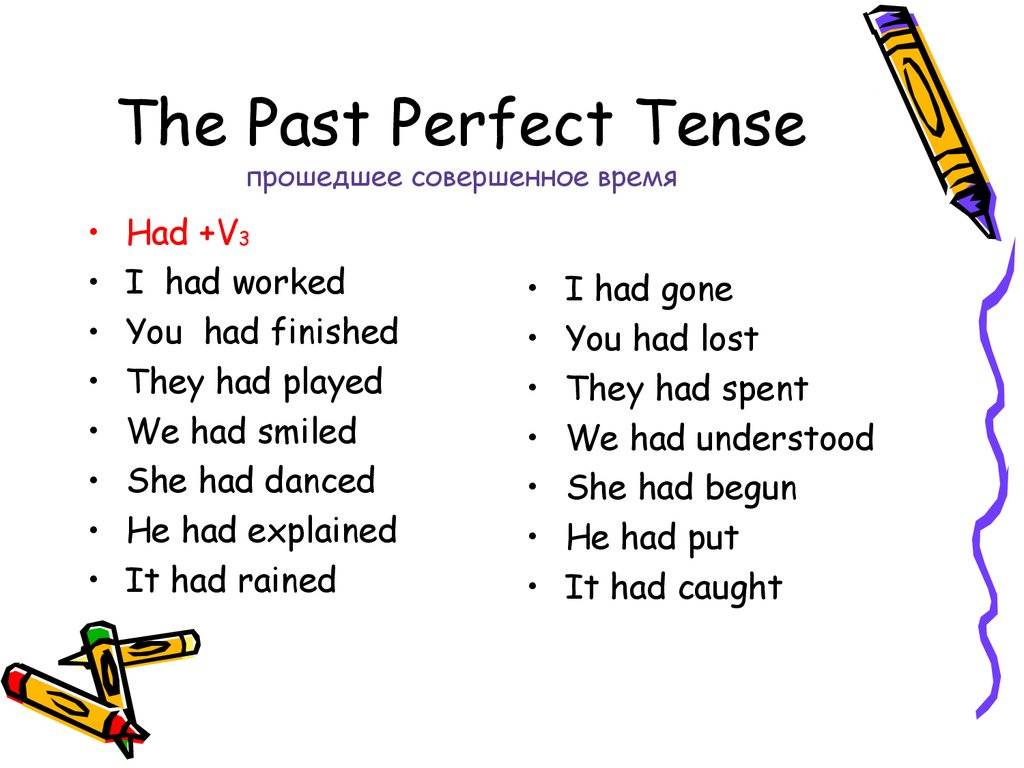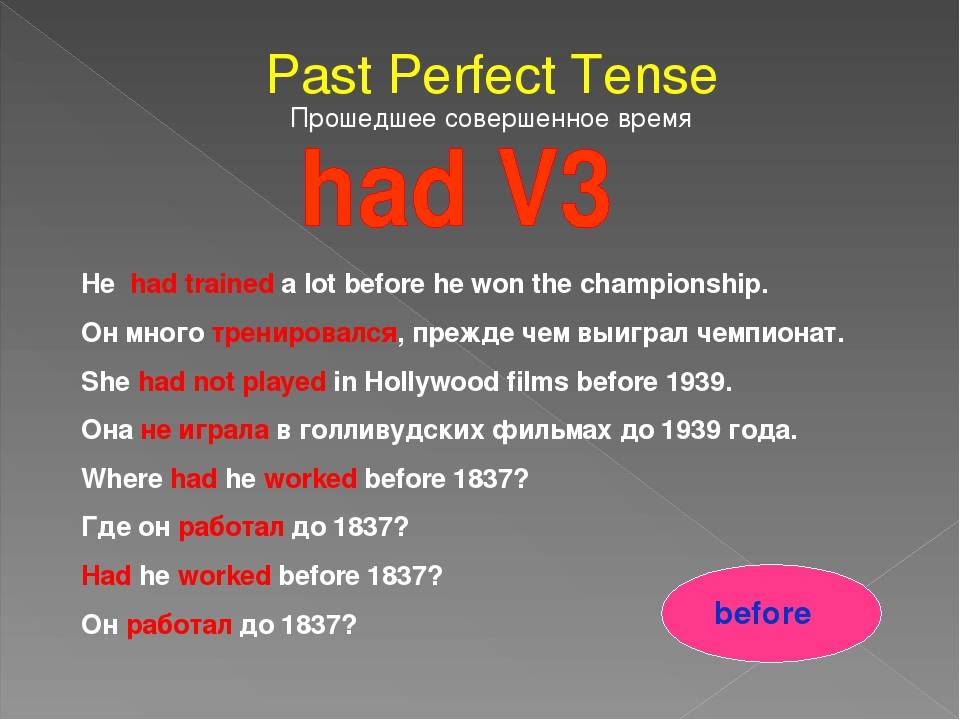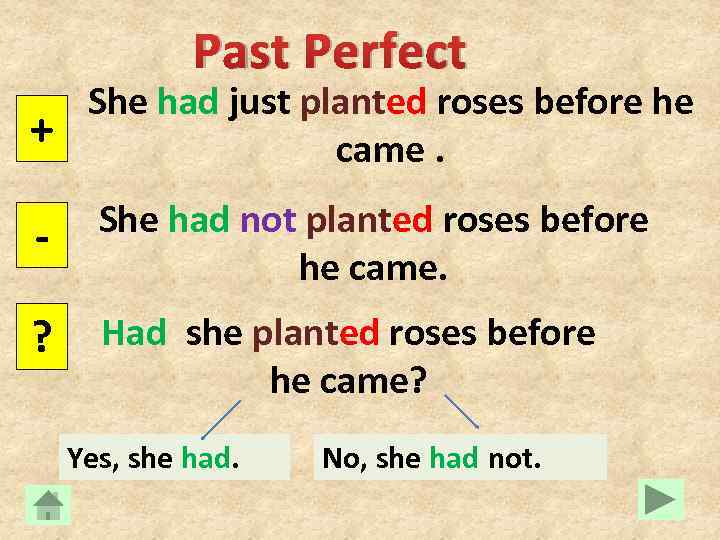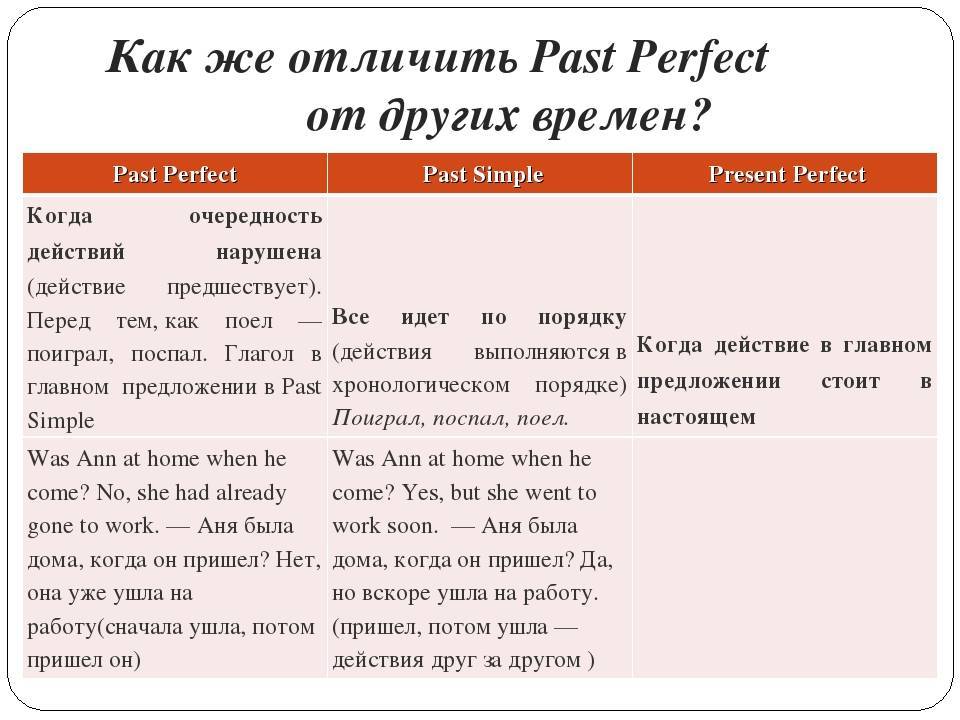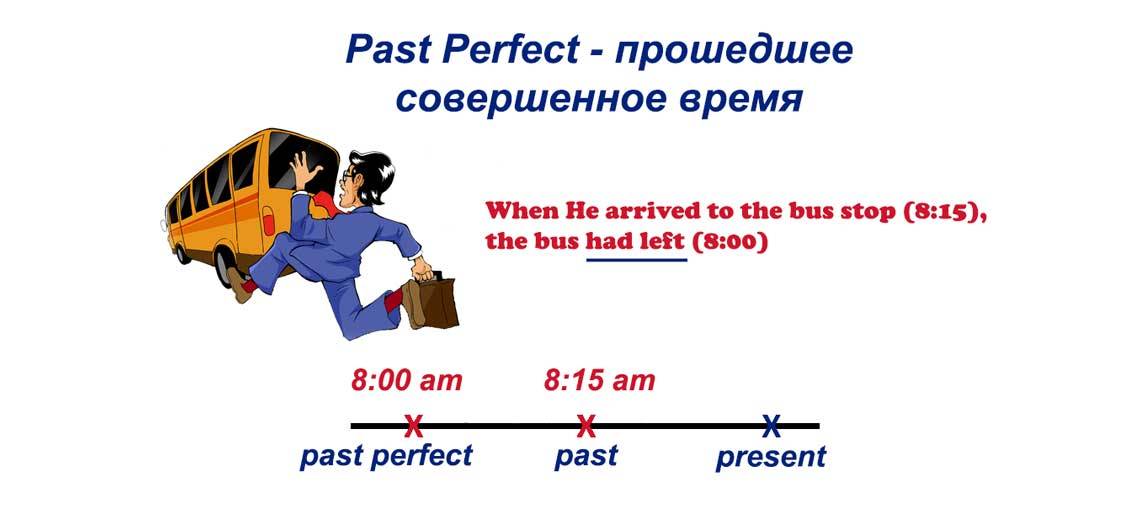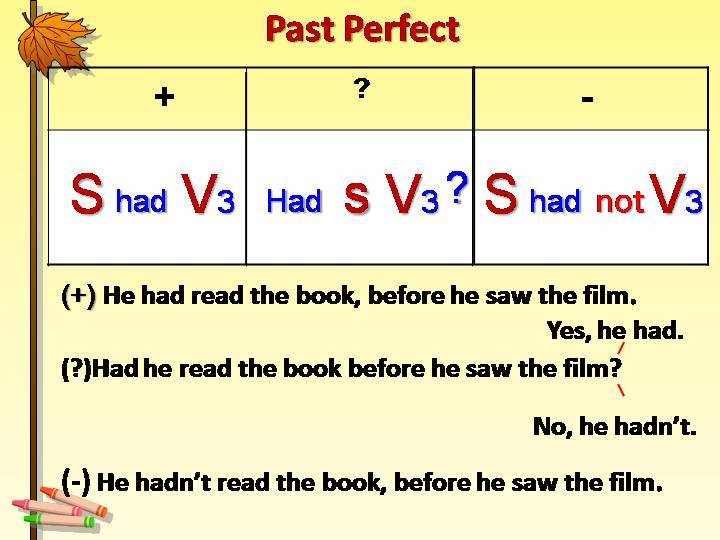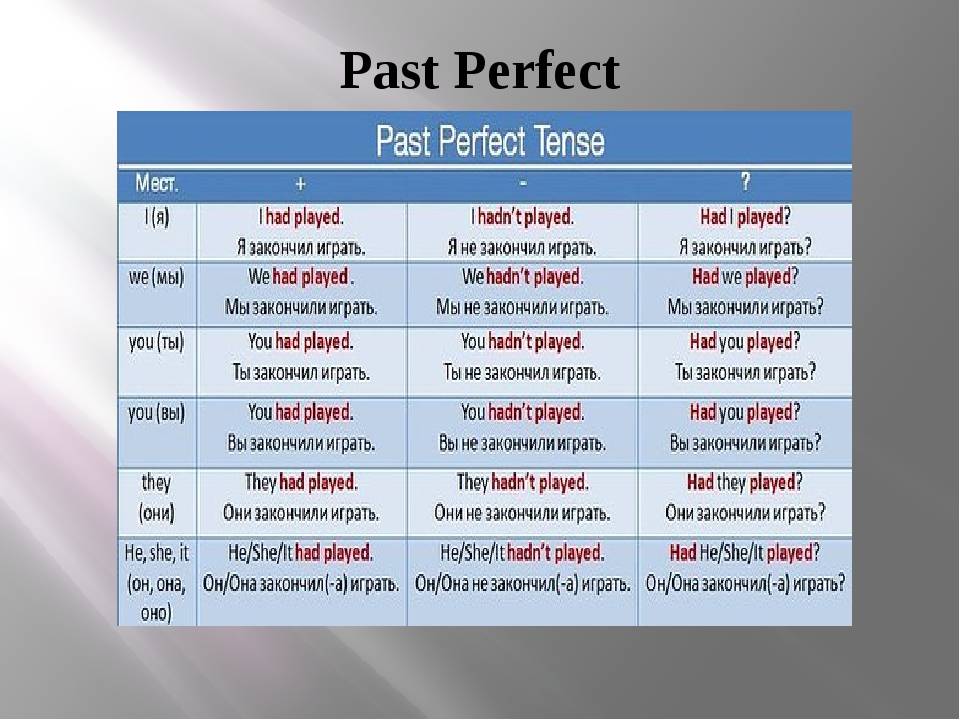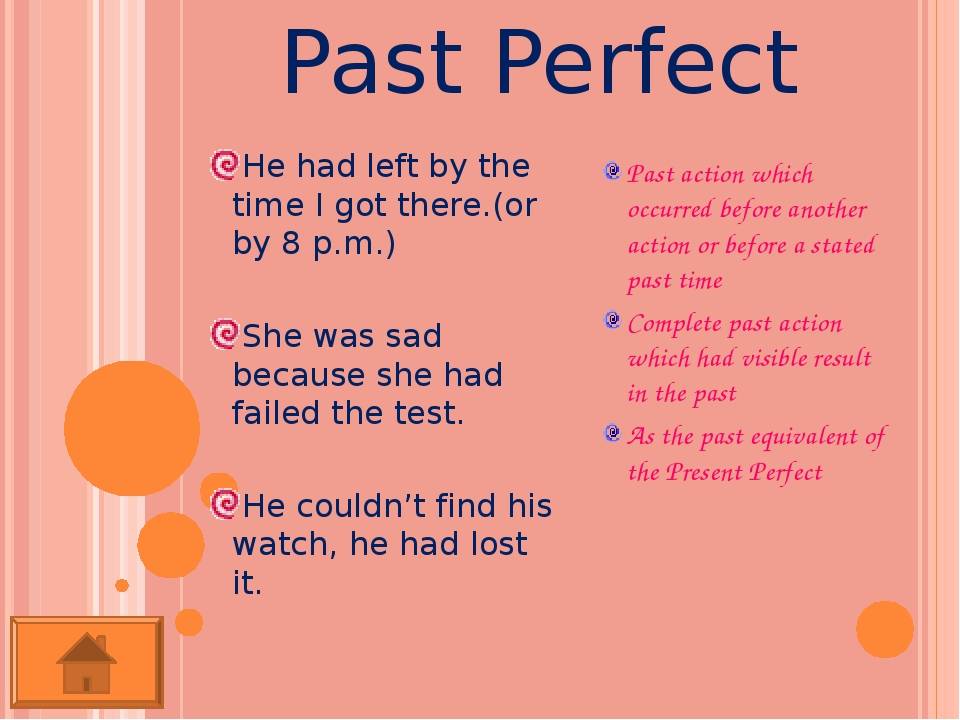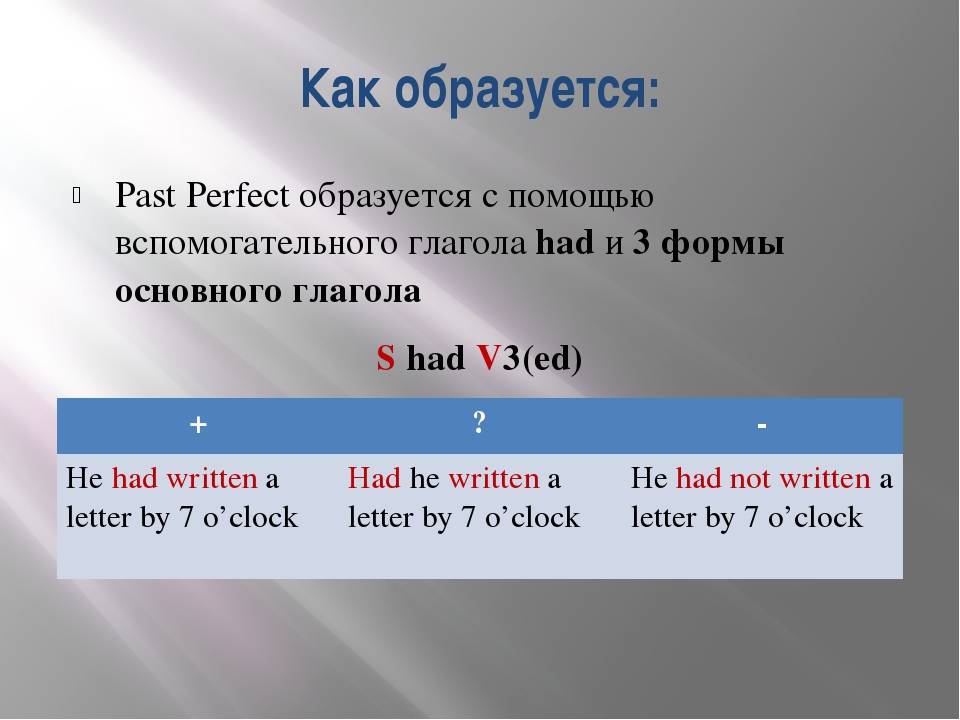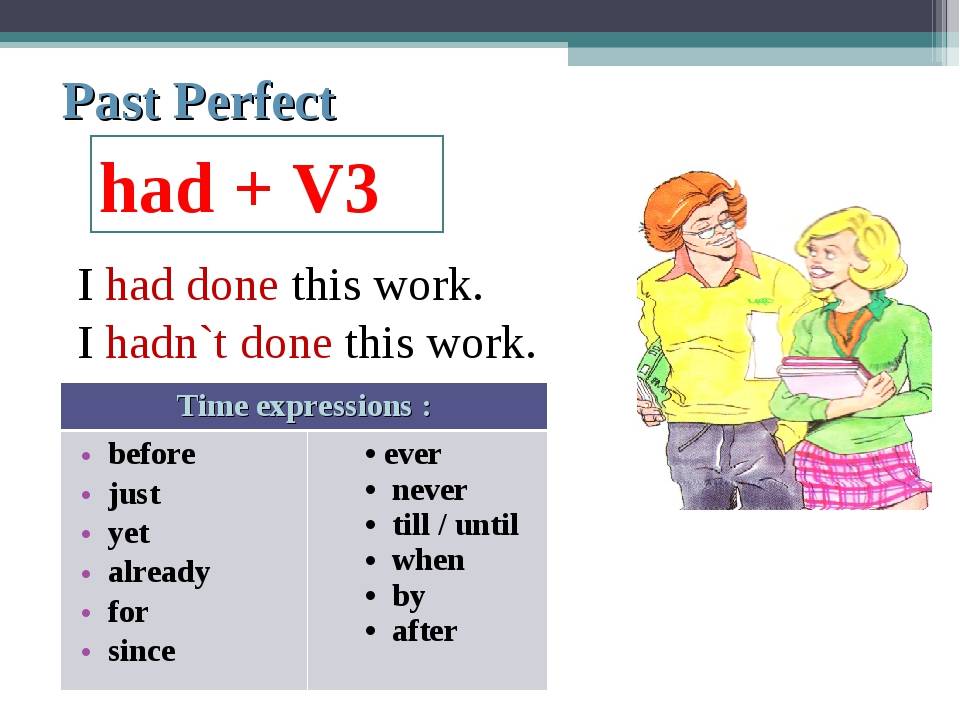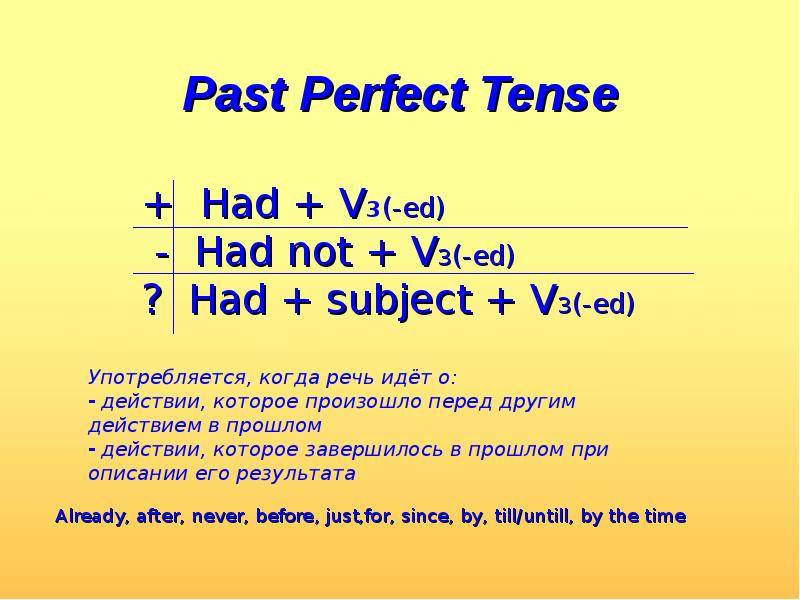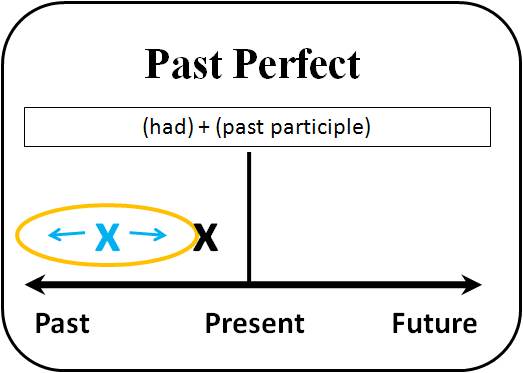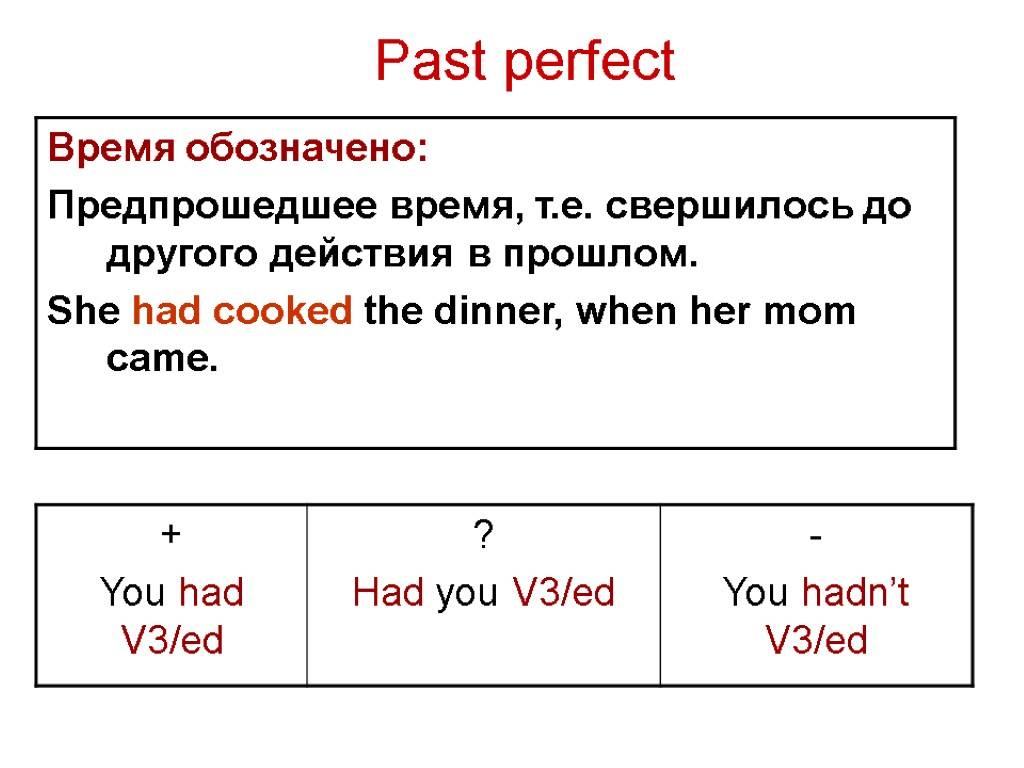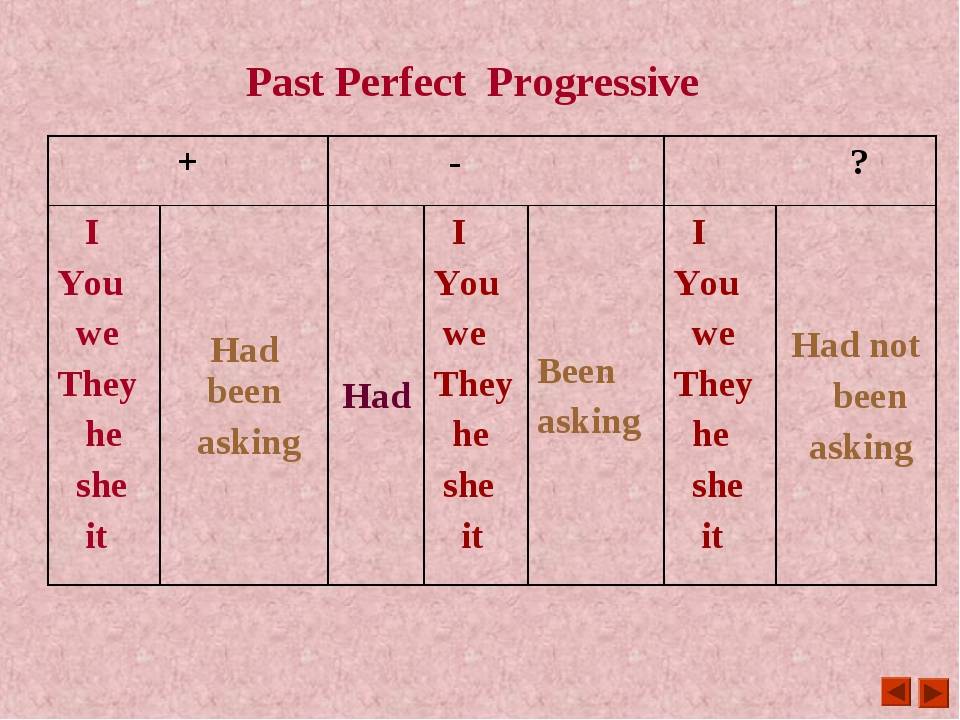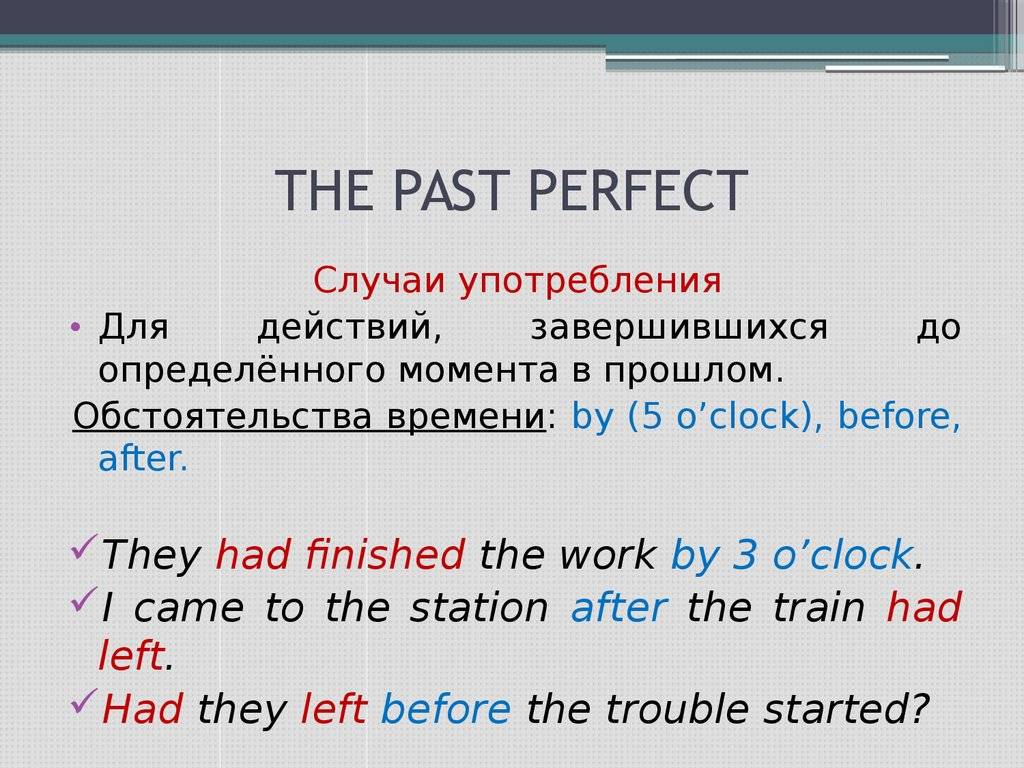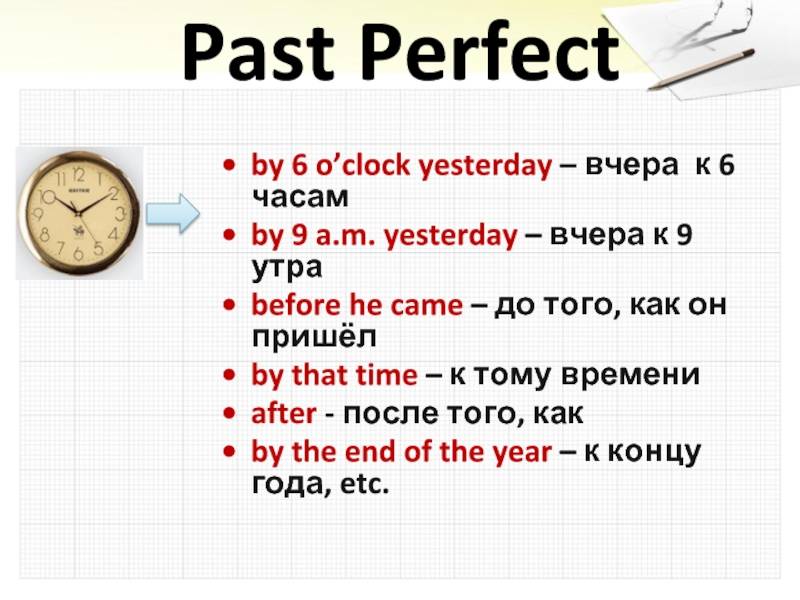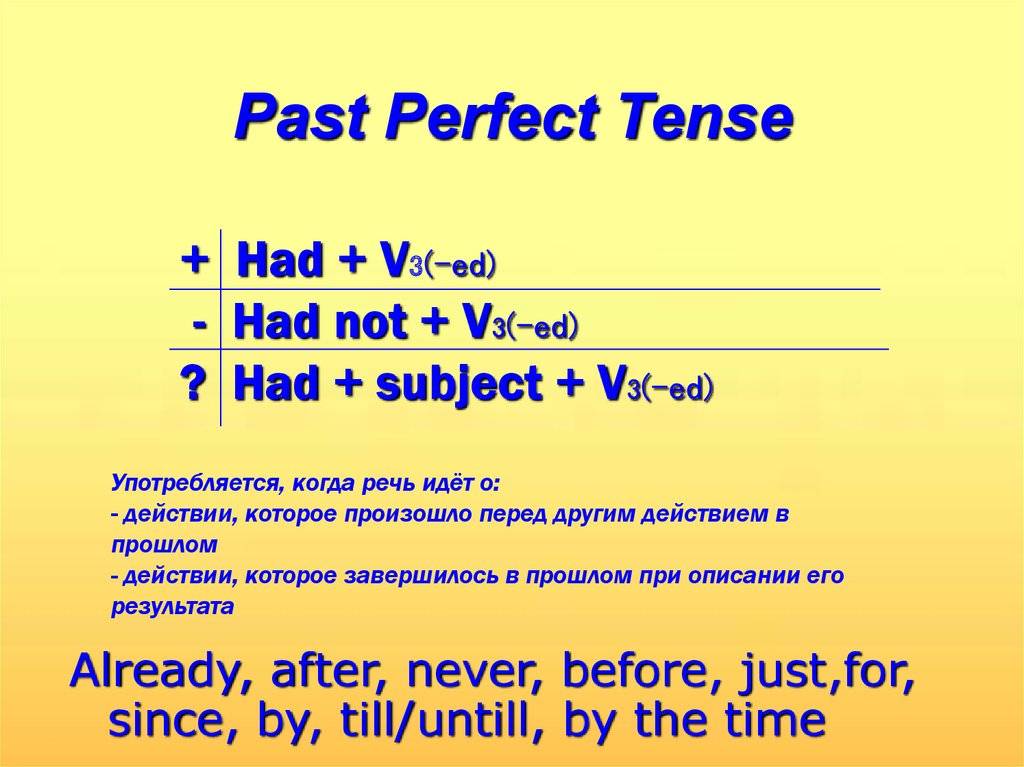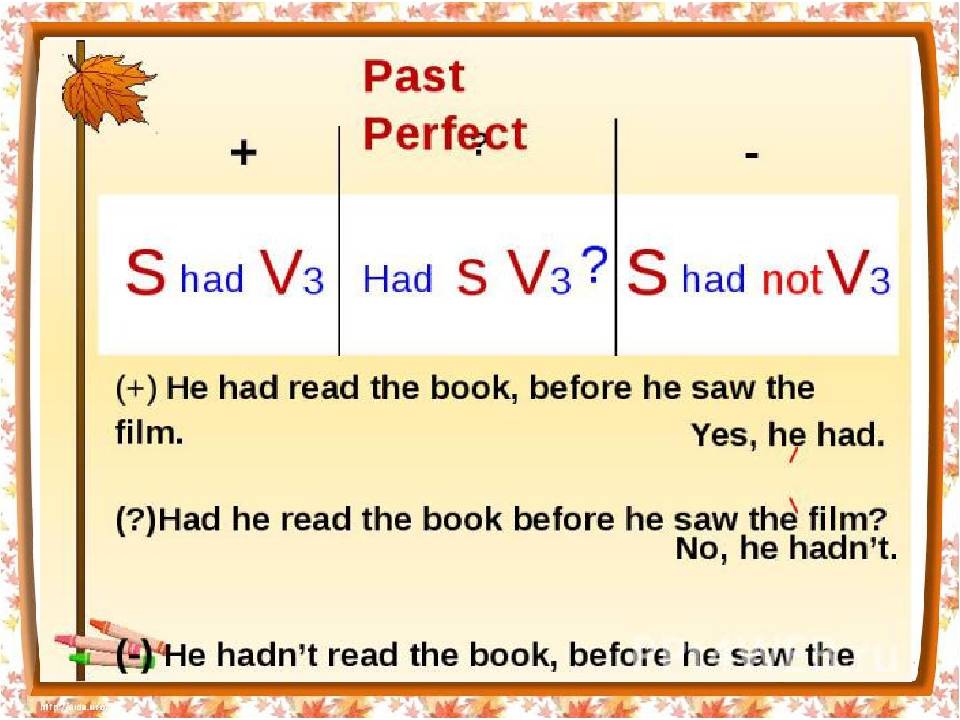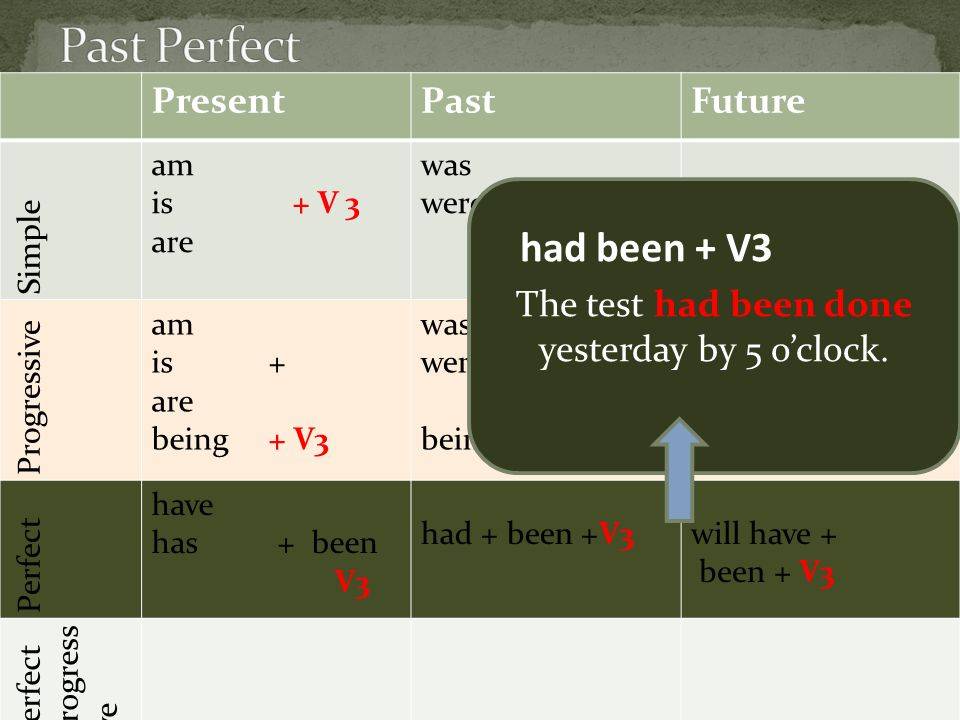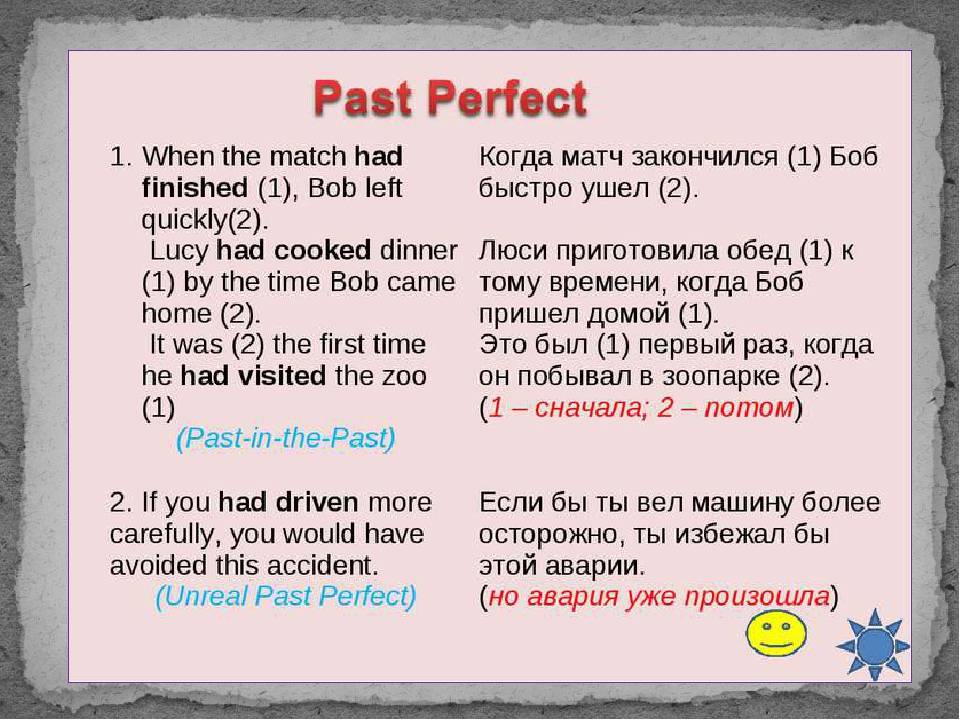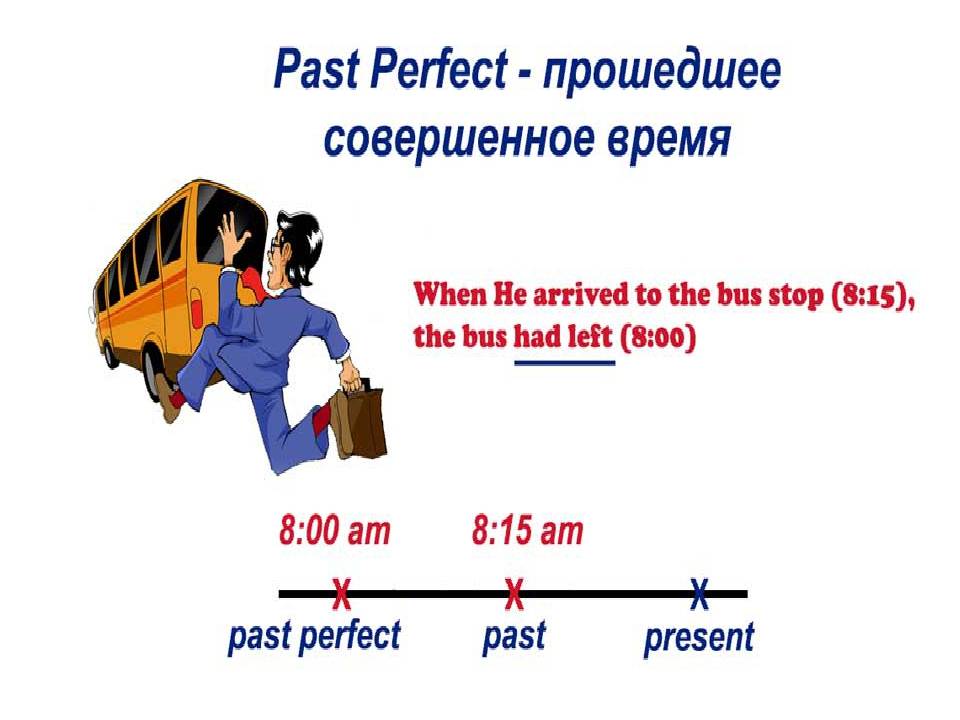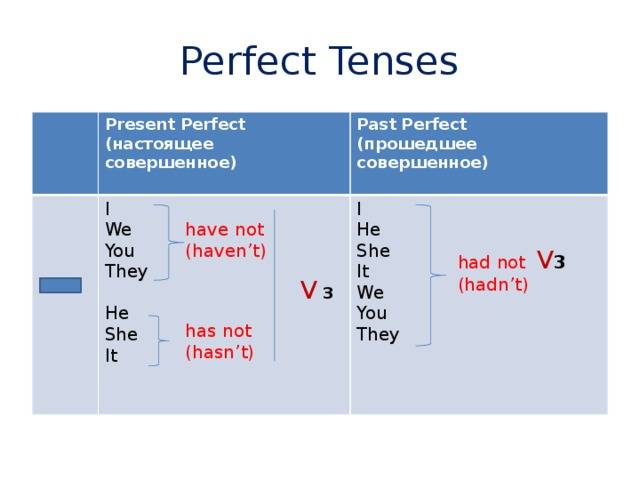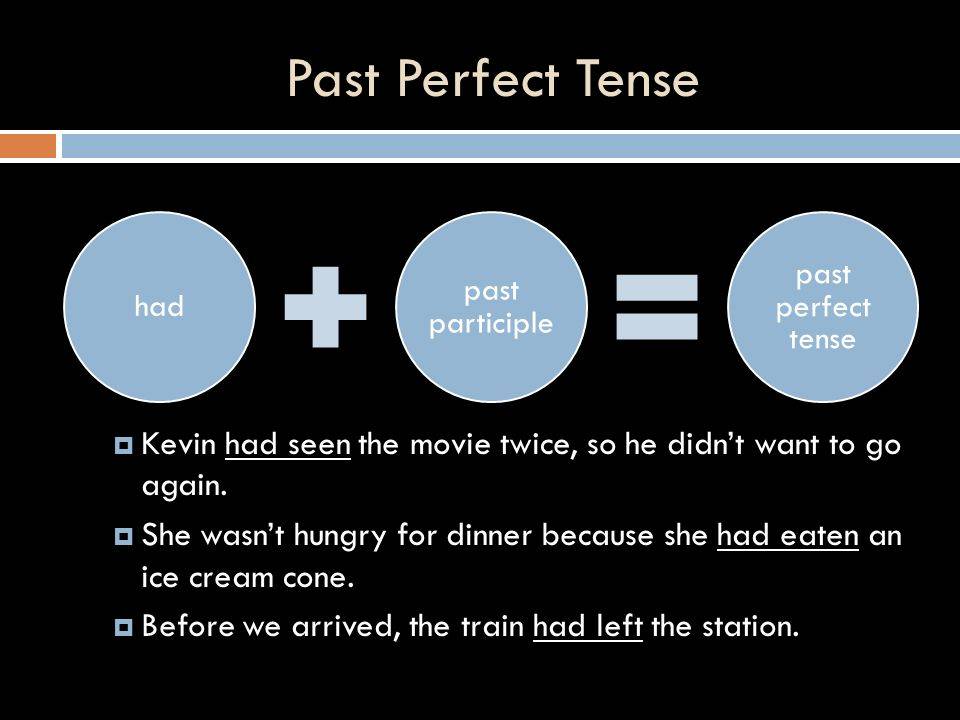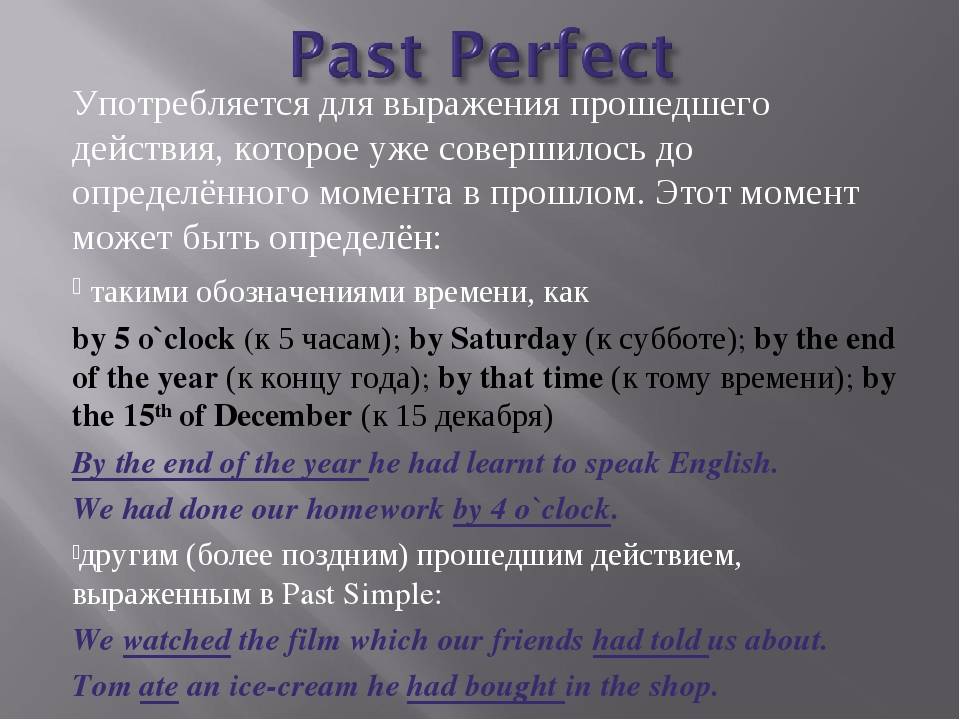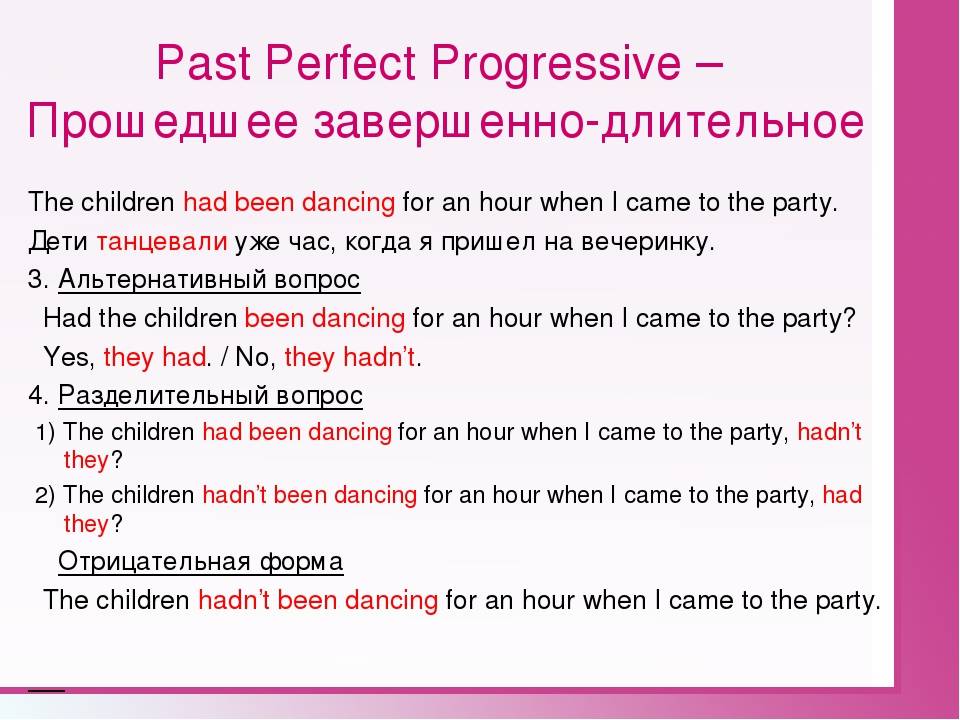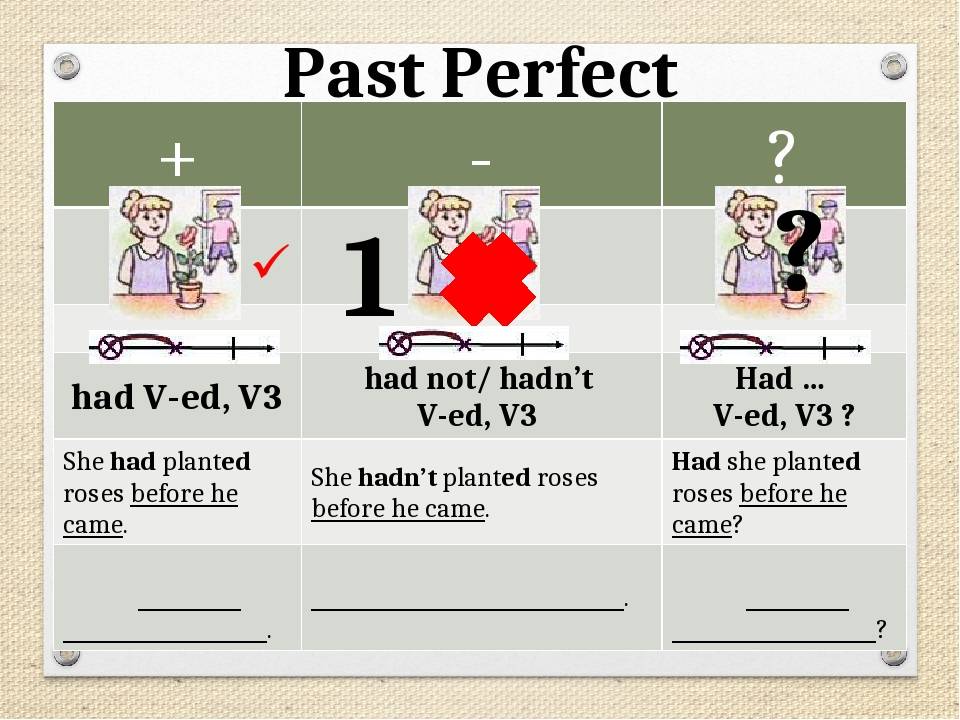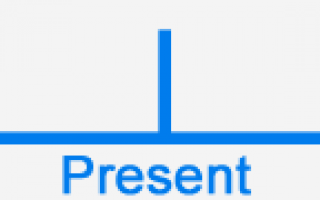What is it Used For?
Let’s look at some additional past perfect tense example to fully understand its many uses.
For actions completed before another begins (both in past):

- I had never flown in an airplane before I went to London.
- After she had attended college, she became a police officer.
- They had forgotten the answer until the teacher reminded them.
These examples indicate that the action began and ended in the past. Furthermore, they began and ended BEFORE a second event occurred. That second event is also in the past.
For actions of duration before something in the past:

- I had attended the event for years without ever having to purchase tickets.
- He had admitted his fault to her repeatedly.
- They would have never known the truth without investigating.
These examples indicate that the action began and ended in the past. Additional, the event also lasted for a period of time (duration) but has now ended.
For actions expressing conditional statements:
- If I had listened during class, I would have passed the test.
- If you had understood me, you would not be asking questions.
- If we had called ahead, we would not have waited.
These examples indicate a conditional action that occurred in the past. The conditional action is a prerequisite to the consequence of the condition.
For reported speech:
- The boss had said it would be a long day.
- The child had wondered how many stars were in the sky.
- The student had asked another question.
These examples indicate speech that occurred in the past. Each of these actions is finished, or complete. It is possible that they occurred more than once or over a period of time.
For showing dissatisfaction with the past:
- I wished I had returned the item.
- He wished he had ordered a different meal.
- We wished we had brought our dog on vacation.
These examples indicate an event that did not happen actually happen. The speaker shows dissatisfaction with his decision (not stated in the sentence) and states the action he wishes had occurred.
Tag Questions in the Past Perfect Simple
Tag questions are those short questions that are tagged onto the end of a sentence. They are used just to make sure that the person you’re talking to understood what you meant or to emphasize what you said.
They’re formed by writing a regular sentence in the past perfect simple, then by adding hadn’t and a pronoun (I, you, we, they, he, she, it) and a question mark.
- John had known about the cancer for a couple of years, hadn’t he?
- They had been in business together, hadn’t they?
You may also add a positive tag when you’re using a negative sentence.
- Jennifer hadn’t spoken to you about it, had she?
- They had never eaten a proper Indian meal, had they?
As a rule: When the sentence is positive, the tag is negative.
When the sentence is negative, the tag is positive.
A quick introduction to the past perfect tense
So what is the past perfect tense in Spanish used for?
The past perfect tense, also known as el pretérito pluscuamperfecto, is really useful for describing a sequence of events in the past.
In other words, this tense is great for telling stories in Spanish.
I mentioned earlier that you may have to combine the past perfect with the past simple or past imperfect…
…well, this is because the past perfect tense describes an event that occurs before another event.
For example,
I had already eaten when you arrived.
I had already woken up when my alarm sounded.
I had already finished my homework when my dad asked me to do it.
As you can see, the word ‘already’ is important here because it tells you that one event is finished before another event starts.
Practice Quiz: Access this Past Perfect Tense quiz to test your knowledge of the Spanish past perfect tense.
For any event that finished prior to another event, you’ll need the Spanish past perfect to describe it.
Let’s see how to form this tense.
Past Perfect Continuous: правила образования
Время Past Perfect Continuous образуется с помощью вспомогательного и основного глаголов. Вспомогательный выражается глаголом to be в Past Perfect (had been). Этот вспомогательный глагол не изменяется по лицам и числам, всегда оставаясь неизменным:
| I
You |
had been |
| He
She It |
|
| We
You They |
Основные глаголы образуются с помощью причастия настоящего времени (Participle I). Для его образования необходимо добавить к глаголу в инфинитиве окончание –ing.
| Infinitive / Инфинитив | V + -ing |
| (to) speak | speaking |
| (to) make | making |
| (to) cry | crying |
| (to) act | acting |
| (to) produce | producing |
| (to) promote | promoting |
| (to) imitate | imitating |
| (to) whistle | whistling |
| (to) exaggerate | exaggerating |
Обратите внимание, что:
- В случаях присоединения окончания к глаголу, оканчивающемуся на –e, –e опускается:
| (to) take | taking |
Однако это правило не распространяется на слова с окончанием –ee:
| (to) see | seeing |
- Если слово оканчивается на –ie, это окончание заменяется на – y:
| (to) tie | tying |
- Если короткий глагол оканчивается на согласную с гласной, согласная удваивается:
| (to) get | getting |
Правило не работает с окончаниями –w и –x:
| (to) bow | bowing |
| (to) fax | faxing |
- –l удваивается в зависимости от языка: 1) В британском английском эта буква на конце удваивается почти всегда;
| (to) travel | travelling |
| (to) distil | distilling |
2) В американском, если на последний слог падает ударение:
| (to) travel | traveling |
| (to) distil | distilling |
- –r же удваивается, если перед ней нет дифтонга:
| (to) suffer | suffering |
| (to) occur | occurring |
Соответственно, соединив обе части, мы получим необходимую конструкцию для образования Past Perfect Continuous:
| had been making | делал |
| had been speaking | говорил |
| had been crying | кричал / плакал |
| had been promoting | продвигал |
Examples for the past perfect tense
This part of the post is where you need to dissect, analyse and understand what is going on.
Choose some options from below and create your own examples sentences, then try them out when you next get an opportunity to speak in Spanish.
1. Ser – To be
I understand the reason ser occurs so frequently is because of the following types of examples (it has never been…):
English: It has never been harder to find work here.Español: Nunca había sido tan difícil encontrar trabajo aquí.
English: It has never been so easy to talk to people in other countries.Español: Nunca había sido tan fácil hablar con gente en otros países.
2. Hacer – to do
English: I had done it many times before, so I did not think about it.Español: Lo había hecho muchas veces antes, así que no pensé en ello.
English: I had already made food when my boyfriend came home with takeaway.Español: Ya había hecho la comida cuando mi novio llegó a casa con comida para llevar.
3. Ver – to see
English: I’d never seen such a (long) line to vote.Español: Nunca había visto tanta cola para votar.
English: They were happy to see me because they hadn’t seen me in months.Español: Ellos estuvieron contentos de verme porque no me habían visto en meses.
4. Decir – to say
English: I didn’t believe that he had told me the true story.Español: No creí que me había dicho la historia real.
English: I couldn’t remember what to do even though he had told me twice.Español: No podía recordar qué hacer a pesar de que me había dicho dos veces.
5. Tener – to have
English: We had to clean the house before going out.Español: Habíamos tenido que limpiar la casa antes de salir.
English: I already had plans when you called me.Español: Ya había tenido planes cuando me llamaste.
6. Estar – to be
English: She had never been so impressed.Español: Ella nunca había estado tan impresionado.
English: I’m traveling around Spain, but I have been here before a few years ago.Español: Estoy viajando por España, pero había estado aquí antes hace unos años.
7. Llegar – to arrive
English: I didn’t know they had already arrived.Español: No sabía que ya habían llegado.
English: I entered quietly because I had arrived late.Español: Entré en silencio porque había llegado tarde.
8. Dar – to give
English: This afternoon I went for a run, but I had already taken a walk this morning.Español: Esta tarde he corrido, pero ya había dado un paseo esta mañana.
English: It surprised me to see the gift because they had already given it to me last year.Español: Me sorprendió ver el regalo porque ya me lo habían dado el año pasado.
9. Ir – to go
English: She told me that they had gone to the beach.Español: Ella me dijo que habían ido a la playa.
English: I couldn’t see my friends because they had already left.Español: No pude ver a mis amigos porque ya se habían ido.
10. Pasar – to pass
English: I wanted to say something, but the moment had passed.Español: Yo quería decir algo, pero el momento había pasado.
English: It was obvious they had had a good time.Español: Era obvio que lo habían pasado bien.
Past Simple формы предложений
В английском языке есть три формы предложений, которые приведены ниже в таблицах.
Утвердительная форма предложения Past Simple Tense (Affirmative sentences)
Схема утвердительных предложений показана в виде таблице.
| Who? Кто? | Form of verb (форма глагола) | Examples (примеры) |
| I (я) | правильный глагол: глагол + ed неправильный глагол: прошедшая форма глагола | I cleaned the kitchen I drank a glass of wine |
| He/She/It (он, она, оно) | правильный глагол: глагол + ed неправильный глагол: прошедшая форма глагола | He worked in Holland He ate a sandwich She joined the class She found a secret door It opened the window It wrote a song |
| You (ты, вы) | правильный глагол: глагол + ed неправильный глагол: прошедшая форма глагола | You washed the floor You went home |
| We (мы) | правильный глагол: глагол + ed неправильный глагол: прошедшая форма глагола | We jumped on the trampoline We drank some water |
| They (они) | правильный глагол: глагол + ed неправильный глагол: прошедшая форма глагола | They hurt each other They knew about us |
Отрицательная форма предложения Past Simple Tense (Negative sentences)
Отрицание Past Simple образуется с помощью вспомогательного глагола to do (прошедшая форма did) и отрицательной частицы not и смыслового глагола без частицы to.
Схема: Subject + did + not + verb + the rest of a sentence
| Who? Кто? | Form of verb (форма глагола) | Examples (примеры) |
| I (я) | did not + глагол | I did not clean the kitchen |
| He/She/It (он, она, оно) | did not + глагол | He did not eat a sandwich She did not join the class It did not open the windows |
| You (ты, вы) | did not + глагол | You did not wash the floor |
| We (мы) | did not + глагол | We did not jump on the trampoline |
| They (они) | did not + глагол | They did not hurt each other |
Сокращенная отрицательная форма:
— We didn’t drink water — She didn’t need a mechanic
Вопросительная форма предложения Past Simple (Interrogative sentences)
Вопросительные предложения строятся по такой формуле:
(Auxiliary verb) Did + subject + verb + the rest of a sentence
В таблице приведены примеры с вопросительными предложениями.
| Глагол to do | Who? Кто? | Form of verb (форма глагола) | Examples (примеры) |
| Did | I (я) | глагол | Did I clean the kitchen? |
| Did | He/She/It (он, она, оно) | глагол | Did he eat a sandwich?Did she join the class? |
| Did | You (ты, вы) | глагол | Did you wash the floor? |
| Did | We (мы) | глагол | Did we jump on the trampoline? |
| Did | They (они) | глагол | Did they hurt each other? |
Сокращенные отрицательно-вопросительные предложения:
— Did you not need a doctor? — Didn’t you need a doctor?
Note:
Мы не используем глагол в прошедшей форме, когда в предложении стоит отрицание.
Сравните:
— WRONG: I didn’t invited her. — CORRECT: I didn’t invite her. — WRONG: Did I invited her? — CORRECT: Did I invite her?
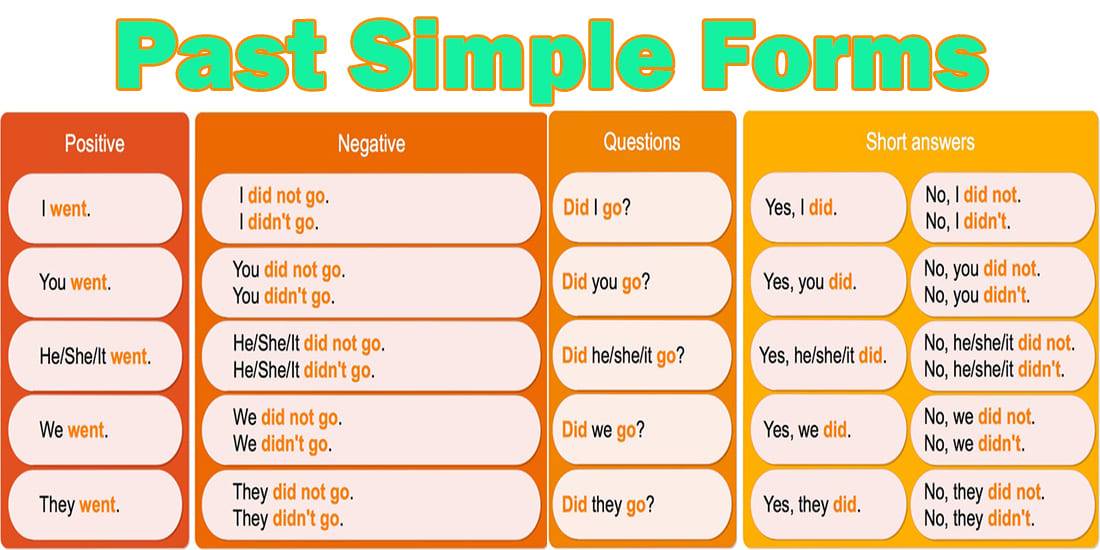
The most commonly occurring verbs in the past perfect
In order to work out the most commonly occurring conjugated verbs in this tense I used a set of data called n-grams for the Spanish language.
For a more detailed explanation of n-grams and how they are used to determine frequency, check out how I used 2-grams in Spanish to work out the most commonly occurring verbs like gustar.
I mentioned in the introduction there is a Spanish phrase that occurs more frequently than ‘otra vez‘ and ‘se llama‘. This is ‘había sido‘ which is the verb ser in this past perfect.
I’m still a little shocked at how commonly this phrase occurs but I’ll show you below a few examples to hint at why this is maybe the case.
But in the meantime, the results of the frequency analysis for the conjugated verbs in the past perfect tense in order are as follows:
| Order | English | Español |
|---|---|---|
| 1 | I had been | Había sido |
| 2 | I had done | Había hecho |
| 3 | I had seen | Había visto |
| 4 | I had said | Había dicho |
| 5 | I had had | Había tenido |
| 6 | I had been | Había estado |
| 7 | I had arrived | Había llegado |
| 8 | I had given | Había dado |
| 9 | I had gone | Había ido |
| 10 | I had passed | Había pasado |
Something to consider with the results of 2-gram review is I don’t know whether the había is the first person or the third person.
The fact that the first and third person are the same in many verb conjugations in Spanish means that it won’t show up in the results from the 2-gram study.
But either way, the verb is still appearing in the past perfect, whether it’s first or third is probably not important.
Разница с другими временами
Сложнее всего нам дается разница между Past Perfect и Past Simple (простым прошедшим временем) и Past Perfect и Present Perfect (настоящим совершенным временем). Вот простая таблицы отличий Past Perfect, Past Simple и Present Perfect.
|
Одно событие в прошлом раньше другого (и нужно это подчеркнуть) He stood up from the bed, brushed teeth, but before he had watched all news on TV. Он встал с кровати, почистил зубы, но перед этим он посмотрел все новости по телеку. |
События в хронологическом порядке He stood up from the bed, brushed teeth, cooked a breakfast. Он встал с кровати, почистил зубы, приготовил завтрак. |
В английском часто Past Perfect заменяют на Past Simple, особенно когда понятна последовательность событий со словами after (после), before (перед), earlier (раньше), first (сперва, сначала).
Bob agreed to meet Mary though he was angry with her as they had had a fight earlier. = Bob agreed to meet Mary though he was angry with her as they had a fight earlier. – Боб согласился встретиться с Мэри, хотя был на нее зол, потому что они поругались.
Но если в предложении есть союз when (когда), лучше не заменять Past Perfect на Past Simple. Это может поменять смысл всего предложения.
- When Bob came, Mary had cooked dinner. – Когда Боб пришел, Мэри приготовила ужин. (Ужин уже был готов к тому моменту, как Боб зашел в квартиру)
- When Bob came, Mary cooked dinner. – Когда Боб пришел, Мэри приготовила ужин. (Боб пришел, и Мэри начала готовить – эти действия случились последовательно)
|
Действие закончилось к определенному моменту в прошлом Bob came home very early yesterday. Mary hadn’t finished cooking dinner yet so he waited. Боб вчера пришел домой рано. Мэри не закончила еще ужин, поэтому он ждал. |
Действие закончилось к определенному моменту в настоящем Mary hasn’t finished cooking yet. Is it ok for Bob to wait? Мэри еще не закончила готовить. Ничего, если Боб подождет? |
Давайте потренируемся
Попробуйте правильно изменить глагол в скобках. Ниже мы дадим правильные ответы, но вы не подглядывайте.
We (had) that car for ten years before it broke down.
Mary did not have any money because she (lose) her wallet.
We were not able to get a table in the restaurant because we (not book) in advance.
Mary (finish) all her wedding preparation by the end of the month.
Правильные ответы:
- We had had that car for ten years before it broke down.
- Mary did not have any money because she had lost her wallet.
- We were not able to get a table in the restaurant because we had not booked in advance.
- Mary had finished all her wedding preparation by the end of the month.
В детской школе Skysmart такие упражнения преподаватель и ученик делают на специальной платформе Vimbox. Внутри платформы: интерактивные задания, словарик с озвучкой слов, ютуб-видео для практики Listening и даже стикеры с лисятами для атмосферы. Убедитесь сами — запишите ребенка на бесплатное вводное занятие и начните заниматься уже завтра.
When to use the Spanish past perfect tense
The next thing you need to think about is finding the right time to throw the Spanish past perfect into conversation.
Here’s a hint from English. Whenever an idea looks as follows:
Something had happened prior to something else
You need to use the past perfect tense for the translation in Spanish.
The key word is ‘had’. It implies an action was completed prior to another action in the past.
Another common word you’ll find with this tense is ‘already’.
I had already done something when something else occurred.
Here is an example:
English: I had already spoken with him before speaking with her.Español: Ya había hablado con él antes de hablar con ella.
In this example, this second verb (hablar) isn’t conjugated in the past but the ‘antes de‘ and the past perfect implies the sequence occurred before the present moment.
Having said that, you can also use the past perfect tense for actions that are happening in the present moment. For example:
English: I’m watching a movie that I have already seen.Español: Estoy viendo una película que ya había visto.
This last example can be a little more hazardous because the English sentence doesn’t have a ‘had’ in it.
That said, it is okay to translate the last part in the above example to the present perfect in Spanish as well.
I will show you some more examples below. But first, I want to show you the most frequently used verbs in this tense.
How do we make the Past Perfect tense?
The structure of the Past Perfect tense is:
| subject | + | auxiliary have | + | main verb |
| conjugated in Past Simple | ||||
| had | past participle |
The auxiliary verb (have) is conjugated in the Past Simple: had
The main verb is invariable in past participle form: -ed (or irregular)
For negative sentences we insert not between the auxiliary verb and the main verb.
For question sentences, we exchange the subject and the auxiliary verb.
Look at these example sentences with the Past Perfect tense:
| subject | auxiliary verb | main verb | |||
|---|---|---|---|---|---|
| + | I | had | finished | my work. | |
| + | You | had | stopped | before me. | |
| — | She | had | not | gone | to school. |
| — | We | had | not | left. | |
| ? | Had | you | arrived? | ||
| ? | Had | they | eaten | dinner? |
Contraction with Past Perfect
When we use the Past Perfect in speaking, we often contract the subject and the auxiliary verb. We also sometimes do this in informal writing:
| I had | I’d |
| you had | you’d |
| he had she had it had |
he’d she’d it’d |
| we had | we’d |
| they had | they’d |
- I’d eaten already.
- They’d gone home.
In negative sentences, we may contract the auxiliary verb and «not»:
- I hadn’t finished my meal.
- Anthony hadn’t had a day off for months.
The ‘d contraction is also used for the auxiliary verb would. For example, we’d can mean:
- We had, OR
- We would
But usually the main verb is in a different form, for example:
- We had arrived (past participle)
- We would arrive (base)
It is always clear from the context.
Маркеры времени
К маркерам времени Past Perfect (Прошедшее Совершенное)относятся следующие обстоятельства, союзы и предлоги:
- By the time – к тому времени как (By the time they came home, my mother had baked an apple pie – К тому времени, как они вернулись домой, моя испекла яблочный пирог);
- After – после определённого момента (She fell asleep after I had left her – Она уснула после того, как я ушёл от неё);
- Before – до определённого момента (She had never been to London before she came here last month – Она никогда не была в Лондоне то того, как приехала сюда в прошлом месяце);
- When – когда (The train had left when he arrived at the station – Поезд ушёл, когда он прибыл на вокзал);
- Just – только что (When she entered the room I had just heard the news – Когда она вошла в комнату, я только что услышал новость);
- Already – уже (I had already finished with my dinner when he knocked on the door – Я уже приготовила ужин, когда он постучал в дверь);
- Yet – ещё (She moved to another city but she had not told her parents about it yet – Она переехала в другой город, но ещё не сказала об этом свои родителям);
- For – в течение (He thought that he was not able to drive a car anymore because he had not driven it for 20 years – Он думал, что не больше не может водить машину, потому что он не водил её 20 лет)
- Since – с тех пор (Her new book was wonderful because she had worked on it since last year – Её новая книга была прекрасной, потому что она работала над ней с прошлого года).
Наречия yet (еще), just (только что), already (уже) являются общей чертой для двух времен Present Perfect (Настоящее Совершенное) и Past Perfect (Прошедшее Совершенное).
Exercises – Past Perfect Simple
Fill in the correct form of the past perfect simple or past simple as in the examples.
- After Loren had turned on the alarm, she locked the door. (turn on)
- By the time Simone arrived, the police had already left. (arrive)
- Had you known about the contract they signed? (know)
- After the company _____Joe, he began to work on his first project. (hire)
- _____you _______ the news before you saw it on TV? (hear)
- Michael didn’t want to see the movie because he _______ the book yet. (not read)
- The concert ______ already _______when we _______ the stadium. (begin/ enter)
- Until Anne ________ Mark, she ____ never ______in love. (meet, be)
- Bill __________ for years before he finally _______. (smoke/ quit)
- _______ Sara ever _______to London by herself before then? (drive)
- How many fish ______ the boys _____ by the time it started raining? (catch)
- You ________ them to go to the beach, hadn’t you? (forbid)
- The girls _______ in weeks? That’s why they ______ so much afterwards. (exercise / hurt)
Answers:
- had hired
- Had/heard
- hadn’t read
- had/begun/entered
- met/had/been
- had smoked/quit
- Had/driven
- had/caught
- had forbidden
- hadn’t exercised / hurt
How do we use the Past Perfect tense?
The Past Perfect tense expresses action in the past before another action in the past. This is the past in the past. For example:
The train left at 9am. We arrived at 9:15am. When we arrived, the train had left.
| The train had left when we arrived. | |||||||
| past | present | future | |||||
| Train leaves in past at 9:00 | |||||||
|
|||||||
| We arrive in past at 9:15 |
Look at some more examples:
- I wasn’t hungry. I had just eaten.
- They were hungry. They had not eaten for five hours.
- I didn’t know who he was. I had never seen him before.
- «Mary wasn’t at home when I arrived.» /
«Really? Where had she gone?»
You can sometimes think of the Past Perfect tense like the Present Perfect tense, but instead of the time being now the time is before.
| have done → |
|||
| had done → |
|||
| past | present | future |
For example, imagine that you arrive at the station at 9:15am. The stationmaster says to you:
«You are too late. The train has left.»
Later, you tell your friends:
«We were too late. The train had left.»
We often use the Past Perfect in reported speech after verbs like: said, told, asked, thought, wondered
Look at these examples:
- He told us that the train had left.
- I thought I had met her before, but I was wrong.
- He explained that he had closed the window because of the rain.
- I wondered if I had been there before.
- I asked them why they had not finished.
Past Perfect QuizEnglishClub :
Learn English :
Grammar : Verbs : Tense : Tenses : Past Perfect
Временное указание
before, after, since (except with was), when, till/until, by (the time)
After we (had) passed our exams, we went out to celebrate – После сдачи экзаменов мы вышли это отпраздновать
They went out after it (had) stopped raining – Они выбежали после прекращения дождя
наречия
just, already, never
Karen didn’t want to come to the cinema with us because she had already seen the film – Кэрен не пошла с нами в кино, так как уже смотрела тот фильм
I’d never seen her before – Я никогда её раньше не видел
наречные фразы
for hours/days/weeks/months/years/decades/centuries…
They hadn’t cleaned the house for weeks – Дом не убирали неделями
English Joke
The sympathetic and inquisitive old lady at the seashore was delighted and thrilled by an old sailor’s narrative of how he was washed overboard during a gale and was only rescued after having sunk for the third time.
«And, of course,» she commented brightly, «after you sank the third time, your whole past life passed before your eyes.»
«I presoom as how it did, mum,» the sailor agreed. «But bein’ as I had my eyes shut, I missed it.»
Negative Sentences in the Past Perfect Simple Tense
When creating negative sentences, we use the auxiliary verbs hadn’t (had not) together with the V3 (past participle) form of the verb. You can also create a negative sentence by using the auxiliary verb had with the time expression never and then the V3.
| Subject | Auxillery Verb | Verb in V3 (Past Participle) |
Rest of Sentence |
| I / You / We / They He / She / It |
hadn’t (had not) | driven | a car before then |
| had never | driven | a car before then |
- I had not eaten at that restaurant before today.
- Samantha hadn’t had time to explain her side of the story.
- My friends hadn’t ever gone to France.
- My friends had never gone to the USA either.

